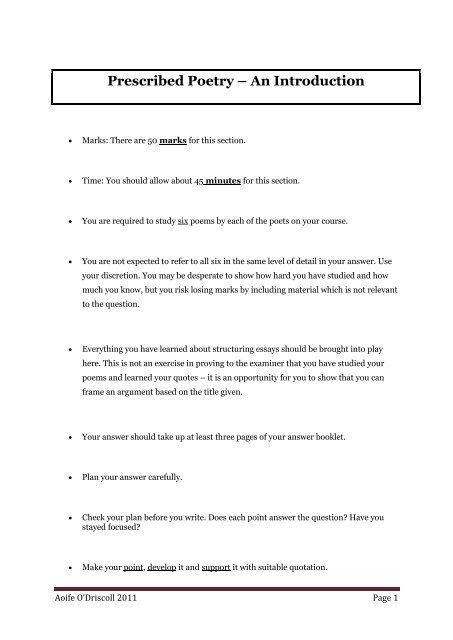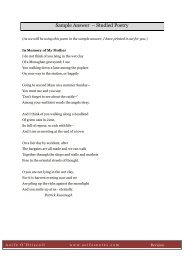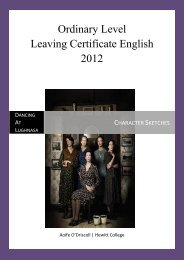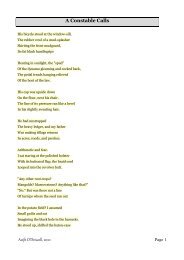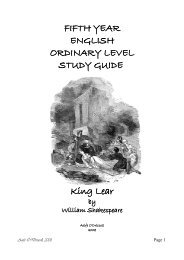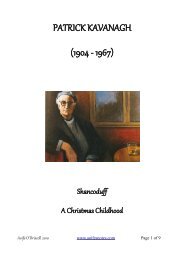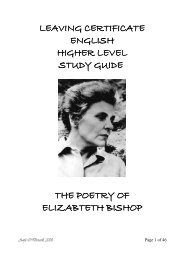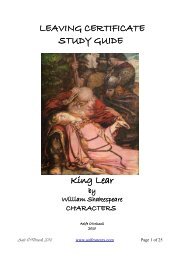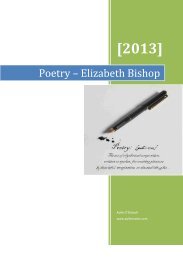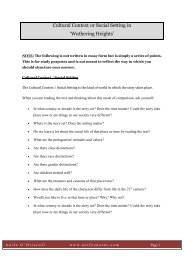Poetry - How to Write the Essay - Focus on Larkin - Aoife's Notes
Poetry - How to Write the Essay - Focus on Larkin - Aoife's Notes
Poetry - How to Write the Essay - Focus on Larkin - Aoife's Notes
Create successful ePaper yourself
Turn your PDF publications into a flip-book with our unique Google optimized e-Paper software.
Prescribed <str<strong>on</strong>g>Poetry</str<strong>on</strong>g> – An Introducti<strong>on</strong><br />
Marks: There are 50 marks for this secti<strong>on</strong>.<br />
Time: You should allow about 45 minutes for this secti<strong>on</strong>.<br />
You are required <str<strong>on</strong>g>to</str<strong>on</strong>g> study six poems by each of <str<strong>on</strong>g>the</str<strong>on</strong>g> poets <strong>on</strong> your course.<br />
You are not expected <str<strong>on</strong>g>to</str<strong>on</strong>g> refer <str<strong>on</strong>g>to</str<strong>on</strong>g> all six in <str<strong>on</strong>g>the</str<strong>on</strong>g> same level of detail in your answer. Use<br />
your discreti<strong>on</strong>. You may be desperate <str<strong>on</strong>g>to</str<strong>on</strong>g> show how hard you have studied and how<br />
much you know, but you risk losing marks by including material which is not relevant<br />
<str<strong>on</strong>g>to</str<strong>on</strong>g> <str<strong>on</strong>g>the</str<strong>on</strong>g> questi<strong>on</strong>.<br />
Everything you have learned about structuring essays should be brought in<str<strong>on</strong>g>to</str<strong>on</strong>g> play<br />
here. This is not an exercise in proving <str<strong>on</strong>g>to</str<strong>on</strong>g> <str<strong>on</strong>g>the</str<strong>on</strong>g> examiner that you have studied your<br />
poems and learned your quotes – it is an opportunity for you <str<strong>on</strong>g>to</str<strong>on</strong>g> show that you can<br />
frame an argument based <strong>on</strong> <str<strong>on</strong>g>the</str<strong>on</strong>g> title given.<br />
Your answer should take up at least three pages of your answer booklet.<br />
Plan your answer carefully.<br />
Check your plan before you write. Does each point answer <str<strong>on</strong>g>the</str<strong>on</strong>g> questi<strong>on</strong>? Have you<br />
stayed focused?<br />
Make your point, develop it and support it with suitable quotati<strong>on</strong>.<br />
Aoife O’Driscoll 2011 Page 1
For many years, <str<strong>on</strong>g>the</str<strong>on</strong>g> questi<strong>on</strong>s were asked in quite a predictable way. Students were simply<br />
asked <str<strong>on</strong>g>to</str<strong>on</strong>g> write a pers<strong>on</strong>al resp<strong>on</strong>se <str<strong>on</strong>g>to</str<strong>on</strong>g> <str<strong>on</strong>g>the</str<strong>on</strong>g> poet: ''The poetry of Elizabeth Bishop appeals <str<strong>on</strong>g>to</str<strong>on</strong>g><br />
<str<strong>on</strong>g>the</str<strong>on</strong>g> modern reader for many reas<strong>on</strong>s.'' <str<strong>on</strong>g>Write</str<strong>on</strong>g> an essay in which you outline why <str<strong>on</strong>g>the</str<strong>on</strong>g> poems<br />
by Elizabeth Bishop have this appeal. - 2002<br />
<str<strong>on</strong>g>How</str<strong>on</strong>g>ever, in recent years, <str<strong>on</strong>g>the</str<strong>on</strong>g> questi<strong>on</strong>s have become more focused: ''Elizabeth Bishop poses<br />
interesting questi<strong>on</strong>s delivered by means of a unique style.'' Do you agree with this<br />
assessment of her poetry? Your answer should focus <strong>on</strong> both <str<strong>on</strong>g>the</str<strong>on</strong>g>mes and stylistic features.<br />
Support your point with <str<strong>on</strong>g>the</str<strong>on</strong>g> aid of suitable reference <str<strong>on</strong>g>to</str<strong>on</strong>g> <str<strong>on</strong>g>the</str<strong>on</strong>g> poems you have studied. - 2009<br />
The main thing <str<strong>on</strong>g>to</str<strong>on</strong>g> remember is that, no matter how <str<strong>on</strong>g>the</str<strong>on</strong>g> questi<strong>on</strong>s are phrased, <str<strong>on</strong>g>the</str<strong>on</strong>g>y are all<br />
basically asking you <str<strong>on</strong>g>to</str<strong>on</strong>g> do <str<strong>on</strong>g>the</str<strong>on</strong>g> same thing – talk about <str<strong>on</strong>g>the</str<strong>on</strong>g> poet's <str<strong>on</strong>g>the</str<strong>on</strong>g>mes and style. Each<br />
questi<strong>on</strong> also requires you <str<strong>on</strong>g>to</str<strong>on</strong>g> prove that you have engaged with <str<strong>on</strong>g>the</str<strong>on</strong>g> works of <str<strong>on</strong>g>the</str<strong>on</strong>g> selected<br />
poet.<br />
Look at <str<strong>on</strong>g>the</str<strong>on</strong>g>se questi<strong>on</strong>s from <str<strong>on</strong>g>the</str<strong>on</strong>g> 2011 Leaving Cert Paper. If you examine <str<strong>on</strong>g>the</str<strong>on</strong>g>m closely, you<br />
will see that <str<strong>on</strong>g>the</str<strong>on</strong>g>y all deal with (a) <strong>on</strong>e or more of <str<strong>on</strong>g>the</str<strong>on</strong>g> poet's main <str<strong>on</strong>g>the</str<strong>on</strong>g>mes, and (b) <str<strong>on</strong>g>the</str<strong>on</strong>g> poet's<br />
style.<br />
1. Emily Dickins<strong>on</strong><br />
“Emily Dickins<strong>on</strong>’s original approach <str<strong>on</strong>g>to</str<strong>on</strong>g> poetry results in startling and thought-provoking<br />
moments in her work.”<br />
Give your resp<strong>on</strong>se <str<strong>on</strong>g>to</str<strong>on</strong>g> <str<strong>on</strong>g>the</str<strong>on</strong>g> poetry of Emily Dickins<strong>on</strong> in <str<strong>on</strong>g>the</str<strong>on</strong>g> light of this statement.<br />
Support your points with suitable reference <str<strong>on</strong>g>to</str<strong>on</strong>g> <str<strong>on</strong>g>the</str<strong>on</strong>g> poems <strong>on</strong> your course.<br />
2. William Butler Yeats<br />
“Yeats can be a challenging poet <str<strong>on</strong>g>to</str<strong>on</strong>g> read, both in terms of style and subject matter.”<br />
To what extent do you agree with this statement? Support your answer with<br />
suitable reference <str<strong>on</strong>g>to</str<strong>on</strong>g> <str<strong>on</strong>g>the</str<strong>on</strong>g> poetry <strong>on</strong> your course.<br />
Aoife O’Driscoll 2011 Page 2
3. Robert Frost<br />
“Frost’s simple style is deceptive and a thoughtful reader will see layers of<br />
meaning in his poetry.”<br />
Do you agree with this assessment of his poetry? <str<strong>on</strong>g>Write</str<strong>on</strong>g> a resp<strong>on</strong>se, supporting<br />
your points with <str<strong>on</strong>g>the</str<strong>on</strong>g> aid of suitable reference <str<strong>on</strong>g>to</str<strong>on</strong>g> <str<strong>on</strong>g>the</str<strong>on</strong>g> poems <strong>on</strong> your course.<br />
4. Eavan Boland<br />
“Boland’s reflective insights are expressed through her precise use of language.”<br />
<str<strong>on</strong>g>Write</str<strong>on</strong>g> your resp<strong>on</strong>se <str<strong>on</strong>g>to</str<strong>on</strong>g> this statement, supporting your answer with suitable<br />
reference <str<strong>on</strong>g>to</str<strong>on</strong>g> <str<strong>on</strong>g>the</str<strong>on</strong>g> poetry <strong>on</strong> your course.<br />
Remember, <str<strong>on</strong>g>the</str<strong>on</strong>g> poems you have studied <strong>on</strong>ly cover a certain number of <str<strong>on</strong>g>the</str<strong>on</strong>g>mes, and <str<strong>on</strong>g>the</str<strong>on</strong>g><br />
poet's style is something you will have examined in detail, so it is easy <str<strong>on</strong>g>to</str<strong>on</strong>g> prepare for any<br />
possible questi<strong>on</strong> if you organise yourself and use a little comm<strong>on</strong> sense.<br />
It can be very helpful <str<strong>on</strong>g>to</str<strong>on</strong>g> make a list of <str<strong>on</strong>g>the</str<strong>on</strong>g> poet's <str<strong>on</strong>g>the</str<strong>on</strong>g>mes and each poem in which <str<strong>on</strong>g>the</str<strong>on</strong>g>se<br />
<str<strong>on</strong>g>the</str<strong>on</strong>g>mes are covered. See <str<strong>on</strong>g>the</str<strong>on</strong>g> example I have started below, using Eavan Boland's poetry:<br />
Love / Relati<strong>on</strong>ships<br />
Love<br />
This Moment<br />
The Pomegranate<br />
The Black Lace Fan my Mo<str<strong>on</strong>g>the</str<strong>on</strong>g>r Gave me<br />
The Shadow Doll<br />
Aoife O’Driscoll 2011 Page 3
Politics / His<str<strong>on</strong>g>to</str<strong>on</strong>g>ry<br />
The War Horse<br />
Child of Our Time<br />
The Famine Road<br />
Marginalised People – The Weak and Vulnerable<br />
The Famine Road<br />
The Shadow Doll<br />
Child of Our Time<br />
Past and Present<br />
The War Horse<br />
The Famine Road<br />
The Black Lace Fan my Mo<str<strong>on</strong>g>the</str<strong>on</strong>g>r Gave me<br />
Love<br />
This is a far from exhaustive list but you should take <str<strong>on</strong>g>the</str<strong>on</strong>g> time <str<strong>on</strong>g>to</str<strong>on</strong>g> go through <str<strong>on</strong>g>the</str<strong>on</strong>g> poems you<br />
have covered and see what <str<strong>on</strong>g>the</str<strong>on</strong>g>mes <str<strong>on</strong>g>the</str<strong>on</strong>g>y share. The next thing you should do is see how those<br />
poems can be linked. Do <str<strong>on</strong>g>the</str<strong>on</strong>g>y share features of style? For example, mythology plays a role in<br />
''The Pomegranate'' and ''Love''. What o<str<strong>on</strong>g>the</str<strong>on</strong>g>r features of style do <str<strong>on</strong>g>the</str<strong>on</strong>g> poems share? What are<br />
<str<strong>on</strong>g>the</str<strong>on</strong>g> similarities and differences between <str<strong>on</strong>g>the</str<strong>on</strong>g>m?<br />
When it comes <str<strong>on</strong>g>to</str<strong>on</strong>g> writing <str<strong>on</strong>g>the</str<strong>on</strong>g> essay itself, you have a choice <str<strong>on</strong>g>to</str<strong>on</strong>g> make. Do you approach it<br />
poem by poem or point by point? In o<str<strong>on</strong>g>the</str<strong>on</strong>g>r words, do you deal with a poem in isolati<strong>on</strong> for a<br />
paragraph or two, and <str<strong>on</strong>g>the</str<strong>on</strong>g>n move <strong>on</strong> <str<strong>on</strong>g>to</str<strong>on</strong>g> ano<str<strong>on</strong>g>the</str<strong>on</strong>g>r poem? Or do you deal with <str<strong>on</strong>g>the</str<strong>on</strong>g><br />
<str<strong>on</strong>g>the</str<strong>on</strong>g>mes/stylistic features and how <str<strong>on</strong>g>the</str<strong>on</strong>g>y are treated in a number of different poems? It is a<br />
matter of pers<strong>on</strong>al choice.<br />
Aoife O’Driscoll 2011 Page 4
D<strong>on</strong>'t be afraid <str<strong>on</strong>g>to</str<strong>on</strong>g> menti<strong>on</strong> links between <str<strong>on</strong>g>the</str<strong>on</strong>g> poet you have studied and o<str<strong>on</strong>g>the</str<strong>on</strong>g>r poets <strong>on</strong> your<br />
course. For example, Boland and Rich both deal with marginalised, vulnerable people. Think<br />
about <str<strong>on</strong>g>the</str<strong>on</strong>g> links between ''The Shadow Doll'' and ''Aunt Jennifer's Tigers''. Or, if you are<br />
discussing style, you might wish <str<strong>on</strong>g>to</str<strong>on</strong>g> point out that both Boland and Kavanagh celebrate <str<strong>on</strong>g>the</str<strong>on</strong>g><br />
ordinary and make it magical in <str<strong>on</strong>g>the</str<strong>on</strong>g>ir writing. Think of Kavanagh talking about <str<strong>on</strong>g>the</str<strong>on</strong>g> beauty of<br />
''The tracks of cattle <str<strong>on</strong>g>to</str<strong>on</strong>g> a drinking-place''.<br />
When you are writing your essay, it is essential <str<strong>on</strong>g>to</str<strong>on</strong>g> show that you engaged with <str<strong>on</strong>g>the</str<strong>on</strong>g> poems <strong>on</strong><br />
your course. You may find <str<strong>on</strong>g>the</str<strong>on</strong>g> following helpful when forming a pers<strong>on</strong>al resp<strong>on</strong>se:<br />
I can empathise with <str<strong>on</strong>g>the</str<strong>on</strong>g> poet because...<br />
The <str<strong>on</strong>g>the</str<strong>on</strong>g>me of … is a universal <strong>on</strong>e, so I found it easy <str<strong>on</strong>g>to</str<strong>on</strong>g> relate <str<strong>on</strong>g>to</str<strong>on</strong>g>...<br />
The poet's eye for detail brings...<str<strong>on</strong>g>to</str<strong>on</strong>g> life, and evokes in me...<br />
What I most admire about <str<strong>on</strong>g>the</str<strong>on</strong>g> poetry of (selected poet) is...<br />
The <str<strong>on</strong>g>the</str<strong>on</strong>g>me is <strong>on</strong>e which has a particular res<strong>on</strong>ance for me because...<br />
The poem opened my eyes <str<strong>on</strong>g>to</str<strong>on</strong>g>...<br />
I was struck by <str<strong>on</strong>g>the</str<strong>on</strong>g> image of...<br />
This poem had a profound impact <strong>on</strong> me because...<br />
I found this image particularly poignant because...<br />
Aoife O’Driscoll 2011 Page 5
Philip <strong>Larkin</strong>:<br />
Quotes<br />
“I think writing about unhappiness is probably <str<strong>on</strong>g>the</str<strong>on</strong>g> source of my popularity, if I have any -<br />
after all, most people are unhappy, d<strong>on</strong>'t you think?”<br />
“Life has a practice of living you, if you d<strong>on</strong>'t live it.”<br />
“Deprivati<strong>on</strong> is for me what daffodils were for Wordsworth.”<br />
“Death is no different whined at than withs<str<strong>on</strong>g>to</str<strong>on</strong>g>od.”<br />
“I'd like <str<strong>on</strong>g>to</str<strong>on</strong>g> think...that people in pubs would talk about my poems”<br />
''Love isn't str<strong>on</strong>ger than death just because statues hold hands for 600 years.'' (<strong>on</strong> <str<strong>on</strong>g>the</str<strong>on</strong>g><br />
manuscript draft of 'An Arundel Tomb'.<br />
"Let me remember that <str<strong>on</strong>g>the</str<strong>on</strong>g> <strong>on</strong>ly married state I intimately know (i.e., that of my parents) is<br />
bloody hell. Never must it be forgotten."<br />
O<str<strong>on</strong>g>the</str<strong>on</strong>g>rs <strong>on</strong> <strong>Larkin</strong>:<br />
''[<strong>Larkin</strong> wrote] in clipped, lucid stanzas, about <str<strong>on</strong>g>the</str<strong>on</strong>g> failures and remorse of age, about<br />
stunted lives and spoiled desires." J.D. McClatchy<br />
"[<strong>Larkin</strong> had] <str<strong>on</strong>g>the</str<strong>on</strong>g> scrupulous awareness of a man who refuses <str<strong>on</strong>g>to</str<strong>on</strong>g> be taken in by inflated<br />
noti<strong>on</strong>s of ei<str<strong>on</strong>g>the</str<strong>on</strong>g>r art or life." Peter R. King: Nine C<strong>on</strong>temporary Poets: A Critical<br />
Introducti<strong>on</strong><br />
"[<strong>Larkin</strong> wrote] <str<strong>on</strong>g>the</str<strong>on</strong>g> most technically brilliant and res<strong>on</strong>antly beautiful, profoundly disturbing<br />
yet appealing and approachable, body of verse of any English poet in <str<strong>on</strong>g>the</str<strong>on</strong>g> last twenty-five<br />
years." Alan Brownjohn in Philip <strong>Larkin</strong>.<br />
''<strong>Larkin</strong> spends a good deal of his time as a poet trying <str<strong>on</strong>g>to</str<strong>on</strong>g> escape his 'ordinary' social self; his<br />
lyricism is his salvati<strong>on</strong>, not just his work.'' Andrew Moti<strong>on</strong> in 'The Guardian'.<br />
Aoife O’Driscoll 2011 Page 6
''<strong>Larkin</strong> was a pers<strong>on</strong> who had profound and unforgettable things <str<strong>on</strong>g>to</str<strong>on</strong>g> say about comm<strong>on</strong><br />
experience.'' Andrew Moti<strong>on</strong> in 'The Guardian'.<br />
''[<strong>Larkin</strong>] avoided <str<strong>on</strong>g>the</str<strong>on</strong>g> literary, <str<strong>on</strong>g>the</str<strong>on</strong>g> metropolitan, <str<strong>on</strong>g>the</str<strong>on</strong>g> group label, and embraced <str<strong>on</strong>g>the</str<strong>on</strong>g><br />
n<strong>on</strong>literary, <str<strong>on</strong>g>the</str<strong>on</strong>g> provincial, and <str<strong>on</strong>g>the</str<strong>on</strong>g> purely pers<strong>on</strong>al." Alun R. J<strong>on</strong>es<br />
''Philip <strong>Larkin</strong> has <str<strong>on</strong>g>the</str<strong>on</strong>g> power <str<strong>on</strong>g>to</str<strong>on</strong>g> make poetry out of material that might seem <str<strong>on</strong>g>to</str<strong>on</strong>g> be<br />
unpromising and intractable. Most of us live in urban or suburban landscapes am<strong>on</strong>g <str<strong>on</strong>g>the</str<strong>on</strong>g><br />
c<strong>on</strong>structi<strong>on</strong>s and <str<strong>on</strong>g>the</str<strong>on</strong>g> detritus of an industrial society. <strong>Larkin</strong> distills poetry from <str<strong>on</strong>g>the</str<strong>on</strong>g><br />
elements that make up this society- an Ode<strong>on</strong> cinema, billboards, scrap heaps of disused<br />
cars, hospital waiting rooms, cut-price shops - which he presents without falsificati<strong>on</strong> or<br />
sentimentality. [He captures] in his poetry attitudes of heart and mind that seem peculiarly<br />
characteristic of our time: doubt, insecurity, boredom, aimlessness, and malaise.<br />
<strong>Larkin</strong> is, like Tennys<strong>on</strong>, an artist of <str<strong>on</strong>g>the</str<strong>on</strong>g> first rank, who employs language with a rare<br />
freshness, precisi<strong>on</strong>, and res<strong>on</strong>ance, and whose verse records with lyrical purity his<br />
experience of l<strong>on</strong>eliness and anguish. He is both <str<strong>on</strong>g>the</str<strong>on</strong>g> unofficial laureate of post-war Britian<br />
and <str<strong>on</strong>g>the</str<strong>on</strong>g> poet who voices most articulately and poignantly <str<strong>on</strong>g>the</str<strong>on</strong>g> spiritual desolati<strong>on</strong> of a world<br />
in which men have shed <str<strong>on</strong>g>the</str<strong>on</strong>g> last rags of religious faith that <strong>on</strong>ce lent meaning and hope <str<strong>on</strong>g>to</str<strong>on</strong>g><br />
human lives. John Press, The <str<strong>on</strong>g>Poetry</str<strong>on</strong>g> of Philip <strong>Larkin</strong>, in The Sou<str<strong>on</strong>g>the</str<strong>on</strong>g>rn Review (Edited for <str<strong>on</strong>g>the</str<strong>on</strong>g><br />
purposes of <str<strong>on</strong>g>the</str<strong>on</strong>g>se notes: AO'D)<br />
''[No living poet] can equal <strong>Larkin</strong> <strong>on</strong> his own ground of <str<strong>on</strong>g>the</str<strong>on</strong>g> familiar English lyric, drastically<br />
and poignantly limited in its sense of any life bey<strong>on</strong>d, before or after, life <str<strong>on</strong>g>to</str<strong>on</strong>g>day in<br />
England." George Dekker<br />
[<strong>Larkin</strong>'s poetry] "expresses uncertainty" and "a feeling of rootlessness" , but "his mood is<br />
never <strong>on</strong>e of despair, and often <str<strong>on</strong>g>the</str<strong>on</strong>g>re is a deep yearning for an escape from futility." C. B. Cox<br />
''Because he is suspicious of any easy c<strong>on</strong>solati<strong>on</strong>, he is sparing of such moments, yet when<br />
<str<strong>on</strong>g>the</str<strong>on</strong>g>y come <str<strong>on</strong>g>the</str<strong>on</strong>g>y stream in<str<strong>on</strong>g>to</str<strong>on</strong>g> <str<strong>on</strong>g>the</str<strong>on</strong>g> discursive and exacting world of his poetry with such<br />
trustworthy force that <str<strong>on</strong>g>the</str<strong>on</strong>g>y call for attenti<strong>on</strong>.'' Seamus Heaney<br />
''At <str<strong>on</strong>g>the</str<strong>on</strong>g> very least <str<strong>on</strong>g>the</str<strong>on</strong>g>re is often a tensi<strong>on</strong> in his poetry between his desire for a quasi-religious<br />
experience and his sense that life is a mess. This tensi<strong>on</strong> is essentially that of many modern<br />
people and explains why <strong>Larkin</strong> speaks so powerfully <str<strong>on</strong>g>to</str<strong>on</strong>g> <str<strong>on</strong>g>the</str<strong>on</strong>g>m. His is a secular voice crying in<br />
<str<strong>on</strong>g>the</str<strong>on</strong>g> wilderness, suspicious yet l<strong>on</strong>ging for <str<strong>on</strong>g>the</str<strong>on</strong>g> mysterious, <str<strong>on</strong>g>the</str<strong>on</strong>g> mystical, <str<strong>on</strong>g>the</str<strong>on</strong>g> sacramental.''<br />
D<strong>on</strong> W. King<br />
Aoife O’Driscoll 2011 Page 7
Brief Biography of Philip <strong>Larkin</strong> (1922-1985)<br />
Philip Arthur <strong>Larkin</strong> was born <strong>on</strong> August 9, 1922, in Coventry. He was <str<strong>on</strong>g>the</str<strong>on</strong>g> sec<strong>on</strong>d child, and<br />
<strong>on</strong>ly s<strong>on</strong>, of Sydney and Eva <strong>Larkin</strong>. Sydney <strong>Larkin</strong> was City Treasurer between <str<strong>on</strong>g>the</str<strong>on</strong>g> years<br />
1922-44. <strong>Larkin</strong>'s sister, some ten years his senior, was called Ca<str<strong>on</strong>g>the</str<strong>on</strong>g>rine, but was known as<br />
Kitty.<br />
He attended <str<strong>on</strong>g>the</str<strong>on</strong>g> City's King Henry VIII School between 1930 and 1940, and made regular<br />
c<strong>on</strong>tributi<strong>on</strong>s <str<strong>on</strong>g>to</str<strong>on</strong>g> <str<strong>on</strong>g>the</str<strong>on</strong>g> school magazine, The Coventrian, which, between 1939 and 1940, he<br />
also helped <str<strong>on</strong>g>to</str<strong>on</strong>g> edit .<br />
After leaving King Henry VIII, he went <str<strong>on</strong>g>to</str<strong>on</strong>g> St. John's College, Oxford, and despite <str<strong>on</strong>g>the</str<strong>on</strong>g> war<br />
(<strong>Larkin</strong> had failed his army medical because of his poor eyesight), was able <str<strong>on</strong>g>to</str<strong>on</strong>g> complete his<br />
degree without interrupti<strong>on</strong>, graduating in 1943 with First Class H<strong>on</strong>ours in English. His<br />
closest friends at Oxford were Kingsley Amis and Bruce M<strong>on</strong>tgomery.<br />
After graduating, <strong>Larkin</strong> lived with his parents for a while, before being appointed Librarian<br />
at Welling<str<strong>on</strong>g>to</str<strong>on</strong>g>n, Shropshire, in November of 1943. Here, he studied <str<strong>on</strong>g>to</str<strong>on</strong>g> qualify as a professi<strong>on</strong>al<br />
librarian, but c<strong>on</strong>tinued <str<strong>on</strong>g>to</str<strong>on</strong>g> write and publish.<br />
In 1946, <strong>Larkin</strong> became assistant Librarian at <str<strong>on</strong>g>the</str<strong>on</strong>g> University College of Leicester. He<br />
completed his professi<strong>on</strong>al studies and became an Associate of <str<strong>on</strong>g>the</str<strong>on</strong>g> Library Associati<strong>on</strong> in<br />
1949. In Oc<str<strong>on</strong>g>to</str<strong>on</strong>g>ber 1950, he became Sub-Librarian at Queen's University, Belfast.<br />
<strong>Larkin</strong> <str<strong>on</strong>g>to</str<strong>on</strong>g>ok up <str<strong>on</strong>g>the</str<strong>on</strong>g> positi<strong>on</strong> of Librarian at <str<strong>on</strong>g>the</str<strong>on</strong>g> University of Hull <strong>on</strong> March 21, 1955, and it<br />
was in Oc<str<strong>on</strong>g>to</str<strong>on</strong>g>ber of that year that The Less Deceived was published. It was this collecti<strong>on</strong> that<br />
would be <str<strong>on</strong>g>the</str<strong>on</strong>g> foundati<strong>on</strong> of his reputati<strong>on</strong> as <strong>on</strong>e of <str<strong>on</strong>g>the</str<strong>on</strong>g> foremost figures in 20th Century<br />
poetry.<br />
It wasn't until 1964 that his next collecti<strong>on</strong>, The Whitsun Weddings was published. Again,<br />
<str<strong>on</strong>g>the</str<strong>on</strong>g> collecti<strong>on</strong> was well received, and widely acclaimed, and <str<strong>on</strong>g>the</str<strong>on</strong>g> following year, <strong>Larkin</strong> was<br />
awarded <str<strong>on</strong>g>the</str<strong>on</strong>g> Queen's Gold Medal for <str<strong>on</strong>g>Poetry</str<strong>on</strong>g>.<br />
It was during <str<strong>on</strong>g>the</str<strong>on</strong>g> years 1961-71 that <strong>Larkin</strong> c<strong>on</strong>tributed m<strong>on</strong>thly reviews of jazz recordings<br />
for <str<strong>on</strong>g>the</str<strong>on</strong>g> Daily Telegraph. He also edited <str<strong>on</strong>g>the</str<strong>on</strong>g> Oxford Book of Twentieth Century English<br />
Verse, which was published in 1973.<br />
His last collecti<strong>on</strong> High Windows was published in 1974, and c<strong>on</strong>firmed him as <strong>on</strong>e of <str<strong>on</strong>g>the</str<strong>on</strong>g><br />
finest poets in English Literary his<str<strong>on</strong>g>to</str<strong>on</strong>g>ry. 'Aubade', his last great poem, was published in The<br />
Times Literary Supplement in December 1977. If this had been <str<strong>on</strong>g>the</str<strong>on</strong>g> <strong>on</strong>ly poem <strong>Larkin</strong> had<br />
ever written, his place in English poetry would still be secure.<br />
Aoife O’Driscoll 2011 Page 8
A collecti<strong>on</strong> of his essays and reviews was published in November 1983 as Required Writing:<br />
miscellaneous pieces 1955-1982, and w<strong>on</strong> <str<strong>on</strong>g>the</str<strong>on</strong>g> W.H. Smith Literary Award for 1984. <strong>Larkin</strong><br />
received many awards in recogniti<strong>on</strong> of his writing, especially in his later years. In 1975 he<br />
was awarded <str<strong>on</strong>g>the</str<strong>on</strong>g> CBE, and in 1976 was given <str<strong>on</strong>g>the</str<strong>on</strong>g> German Shakespeare-Pries. He chaired <str<strong>on</strong>g>the</str<strong>on</strong>g><br />
Booker Prize Panel in 1977, was made Compani<strong>on</strong> of Literature in 1978, and served <strong>on</strong> <str<strong>on</strong>g>the</str<strong>on</strong>g><br />
Literature Panel of <str<strong>on</strong>g>the</str<strong>on</strong>g> Arts between 1980 and 1982. He was made an H<strong>on</strong>orary Fellow of <str<strong>on</strong>g>the</str<strong>on</strong>g><br />
Library Associati<strong>on</strong> in 1980. In 1982 <str<strong>on</strong>g>the</str<strong>on</strong>g> University of Hull made him a Professor.<br />
In 1984 he received an h<strong>on</strong>orary D.Litt. from Oxford University, and was elected <str<strong>on</strong>g>to</str<strong>on</strong>g> <str<strong>on</strong>g>the</str<strong>on</strong>g><br />
Board of <str<strong>on</strong>g>the</str<strong>on</strong>g> British Library. In December of 1984 he was offered <str<strong>on</strong>g>the</str<strong>on</strong>g> chance <str<strong>on</strong>g>to</str<strong>on</strong>g> succeed Sir<br />
John Betjeman as Poet Laureate but declined, being unwilling <str<strong>on</strong>g>to</str<strong>on</strong>g> accept <str<strong>on</strong>g>the</str<strong>on</strong>g> high public<br />
profile and associated media attenti<strong>on</strong> of <str<strong>on</strong>g>the</str<strong>on</strong>g> positi<strong>on</strong>.<br />
In mid 1985 <strong>Larkin</strong> was admitted <str<strong>on</strong>g>to</str<strong>on</strong>g> hospital with an illness in his throat, and <strong>on</strong> June 11 an<br />
operati<strong>on</strong> was carried out <str<strong>on</strong>g>to</str<strong>on</strong>g> remove his oesophagus. His health was deteriorating, and when<br />
he was awarded <str<strong>on</strong>g>the</str<strong>on</strong>g> much prized Order of <str<strong>on</strong>g>the</str<strong>on</strong>g> Compani<strong>on</strong> of H<strong>on</strong>our he was unable, because<br />
of ill health, <str<strong>on</strong>g>to</str<strong>on</strong>g> attend <str<strong>on</strong>g>the</str<strong>on</strong>g> investiture, which was due <str<strong>on</strong>g>to</str<strong>on</strong>g> take place at Buckingham Palace <strong>on</strong><br />
November 25. He received <str<strong>on</strong>g>the</str<strong>on</strong>g> official notificati<strong>on</strong> courtesy of <str<strong>on</strong>g>the</str<strong>on</strong>g> Royal Mail.<br />
Philip <strong>Larkin</strong> died of cancer at 1.24 a.m. <strong>on</strong> M<strong>on</strong>day December 2 1985. He was 63 years old.<br />
By James L. Orwin of The Philip <strong>Larkin</strong> Society. This biography has been<br />
slightly shortened for <str<strong>on</strong>g>the</str<strong>on</strong>g> purposes of <str<strong>on</strong>g>the</str<strong>on</strong>g>se notes but <str<strong>on</strong>g>the</str<strong>on</strong>g> full versi<strong>on</strong> can be<br />
found <strong>on</strong> The Philip <strong>Larkin</strong> Society website. AO'D<br />
Aoife O’Driscoll 2011 Page 9
Marriage:<br />
The Whitsun Weddings<br />
An Arundel Tomb<br />
Wedding Wind<br />
Church Going<br />
Death/Transience of Life:<br />
At Grass<br />
An Arundel Tomb<br />
MCMXIV<br />
The Trees<br />
Ambulances<br />
The Explosi<strong>on</strong><br />
Cut Grass<br />
Church Going<br />
Religi<strong>on</strong>:<br />
Church Going<br />
An Arundel Tomb<br />
The Explosi<strong>on</strong><br />
Poems Arranged by Theme<br />
The passing of <str<strong>on</strong>g>the</str<strong>on</strong>g> old world and its<br />
values:<br />
Church Going<br />
An Arundel Tomb<br />
MCMXIV<br />
The Whitsun Weddings<br />
Man and nature:<br />
At Grass<br />
An Arundel Tomb<br />
The Trees<br />
The Explosi<strong>on</strong><br />
Cut Grass<br />
MCMXIV<br />
The Whitsun Weddings<br />
Church Going<br />
Aoife O’Driscoll 2011 Page 10
Planning Your <str<strong>on</strong>g>Essay</str<strong>on</strong>g> <strong>on</strong> <strong>Larkin</strong><br />
After you have arranged your poems by <str<strong>on</strong>g>the</str<strong>on</strong>g>me, <str<strong>on</strong>g>the</str<strong>on</strong>g> next step is <str<strong>on</strong>g>to</str<strong>on</strong>g> look at <str<strong>on</strong>g>the</str<strong>on</strong>g> <str<strong>on</strong>g>to</str<strong>on</strong>g>ne of <str<strong>on</strong>g>the</str<strong>on</strong>g><br />
poems. This can be a good starting point for your essay plan. In o<str<strong>on</strong>g>the</str<strong>on</strong>g>r words if you were<br />
writing about <strong>Larkin</strong>'s view of marriage or romantic love, which poems would you use and in<br />
which order? Look at <str<strong>on</strong>g>the</str<strong>on</strong>g> diagram below <str<strong>on</strong>g>to</str<strong>on</strong>g> give yourself an idea of <strong>on</strong>e possible approach.<br />
The poems chosen move from negative <str<strong>on</strong>g>to</str<strong>on</strong>g> positive.<br />
Marriage/Romantic Love<br />
Introducti<strong>on</strong><br />
<strong>Larkin</strong>'s view of marriage ra<str<strong>on</strong>g>the</str<strong>on</strong>g>r cynical<br />
Use quote from Andrew Moti<strong>on</strong> about married state being 'bloody hell'<br />
In this essay... admire philosophical approach and acknowledgement that some questi<strong>on</strong>s<br />
cannot be answered<br />
The Whitsun Weddings<br />
Seems <str<strong>on</strong>g>to</str<strong>on</strong>g> see cerem<strong>on</strong>y/celebrati<strong>on</strong>s as faintly ridiculous and almost damaging,<br />
Church Going<br />
Yet he recognises <str<strong>on</strong>g>the</str<strong>on</strong>g> importance of cerem<strong>on</strong>y for people<br />
An Arundel Tomb<br />
He is moved by <str<strong>on</strong>g>the</str<strong>on</strong>g> apparent love that existed between <str<strong>on</strong>g>the</str<strong>on</strong>g> earl and countess but<br />
struggles with <str<strong>on</strong>g>the</str<strong>on</strong>g> idea of love surviving.<br />
Wedding Wind<br />
Quite positive view<br />
Aoife O’Driscoll 2011 Page 11
Next, you should think about a) a pers<strong>on</strong>al resp<strong>on</strong>se <str<strong>on</strong>g>to</str<strong>on</strong>g> each poem and b) link sentences<br />
which will lead you from <strong>on</strong>e poem <str<strong>on</strong>g>to</str<strong>on</strong>g> <str<strong>on</strong>g>the</str<strong>on</strong>g> next. The link sentence can be at <str<strong>on</strong>g>the</str<strong>on</strong>g> end of <strong>on</strong>e<br />
paragraph or <str<strong>on</strong>g>the</str<strong>on</strong>g> beginning of <str<strong>on</strong>g>the</str<strong>on</strong>g> next.<br />
Sample <str<strong>on</strong>g>Essay</str<strong>on</strong>g> Plan and Full <str<strong>on</strong>g>Essay</str<strong>on</strong>g><br />
It is absolutely vital that you write an essay plan. Remember, it need not make sense <str<strong>on</strong>g>to</str<strong>on</strong>g><br />
any<strong>on</strong>e but you. D<strong>on</strong>'t waste your time writing full sentences. (I have written a reas<strong>on</strong>ably<br />
detailed plan so that you can see what I wanted <str<strong>on</strong>g>to</str<strong>on</strong>g> say. If I were doing it for my own<br />
purposes <strong>on</strong>ly, <str<strong>on</strong>g>the</str<strong>on</strong>g>n it would be full of abbreviati<strong>on</strong>s, crossing out, and hastily scribbled<br />
notes.) The plan will simply be a trigger for your memory when you are writing <str<strong>on</strong>g>the</str<strong>on</strong>g> essay. It<br />
will also keep you focused. There is much you could say about each poem, but you must<br />
c<strong>on</strong>fine yourself <str<strong>on</strong>g>to</str<strong>on</strong>g> those points that are relevant <str<strong>on</strong>g>to</str<strong>on</strong>g> <str<strong>on</strong>g>the</str<strong>on</strong>g> essay title. If you simply write all you<br />
know about each poem, you will get a low grade. Your essay must be going somewhere.<br />
Think of it as a persuasive piece. You are trying <str<strong>on</strong>g>to</str<strong>on</strong>g> c<strong>on</strong>vince <str<strong>on</strong>g>the</str<strong>on</strong>g> examiner that your approach<br />
and your interpretati<strong>on</strong> is a valid <strong>on</strong>e.<br />
Try <str<strong>on</strong>g>to</str<strong>on</strong>g> move from poem <str<strong>on</strong>g>to</str<strong>on</strong>g> poem in some sort of logical order.<br />
Note: This pers<strong>on</strong>al resp<strong>on</strong>se <str<strong>on</strong>g>to</str<strong>on</strong>g> <str<strong>on</strong>g>the</str<strong>on</strong>g> poetry of Philip <strong>Larkin</strong> will be based <strong>on</strong> his search for<br />
meaning in life, particularly his ra<str<strong>on</strong>g>the</str<strong>on</strong>g>r bleak view of <str<strong>on</strong>g>the</str<strong>on</strong>g> transience and brevity of our time<br />
<strong>on</strong> earth. It will also explore <str<strong>on</strong>g>the</str<strong>on</strong>g> way in which he uses simple, colloquial language and<br />
beautiful descripti<strong>on</strong>s drawn from nature <str<strong>on</strong>g>to</str<strong>on</strong>g> make his poetry appealing and accessible <str<strong>on</strong>g>to</str<strong>on</strong>g><br />
all.<br />
Introducti<strong>on</strong><br />
Themes: Life is short and brief. All changes. Does anything of us survive?<br />
Style: Philosophical questi<strong>on</strong>s framed in simple language. Lack of overt sentimentality.<br />
Beautiful, sensitive descripti<strong>on</strong>s balance sometimes bleak message. Asks questi<strong>on</strong>s and<br />
allows us <str<strong>on</strong>g>to</str<strong>on</strong>g> come <str<strong>on</strong>g>to</str<strong>on</strong>g> our own c<strong>on</strong>clusi<strong>on</strong>s. Cynicism versus gentle c<strong>on</strong>templati<strong>on</strong>.<br />
Aoife O’Driscoll 2011 Page 12
MCMXIV<br />
Death is near, <str<strong>on</strong>g>the</str<strong>on</strong>g> world is changing, <str<strong>on</strong>g>the</str<strong>on</strong>g> men in <str<strong>on</strong>g>the</str<strong>on</strong>g> picture are unaware of this.<br />
Nature is all that will survive – it is indifferent <str<strong>on</strong>g>to</str<strong>on</strong>g> man's plight<br />
An Arundel Tomb<br />
Link: Different approach <str<strong>on</strong>g>to</str<strong>on</strong>g> same <str<strong>on</strong>g>to</str<strong>on</strong>g>pic. This time viewing transience of life / change from<br />
<str<strong>on</strong>g>the</str<strong>on</strong>g> perspective of <str<strong>on</strong>g>the</str<strong>on</strong>g> Earl and Countess. The world has changed so much that those who<br />
view <str<strong>on</strong>g>the</str<strong>on</strong>g>m now have little understanding of who <str<strong>on</strong>g>the</str<strong>on</strong>g>y were.<br />
Questi<strong>on</strong> – what will survive of us is love? True or a lie? Ambiguity – no real answer.<br />
Church Going<br />
Link: Uncertainty. If an Arundel Tomb explored <str<strong>on</strong>g>the</str<strong>on</strong>g> idea of change, <str<strong>on</strong>g>the</str<strong>on</strong>g> passage of time and<br />
<str<strong>on</strong>g>the</str<strong>on</strong>g> meaning of life by looking <str<strong>on</strong>g>to</str<strong>on</strong>g> <str<strong>on</strong>g>the</str<strong>on</strong>g> past, <str<strong>on</strong>g>the</str<strong>on</strong>g>n Church Going is a journey in<str<strong>on</strong>g>to</str<strong>on</strong>g> a possible<br />
future.<br />
Man erects churches, clings <str<strong>on</strong>g>to</str<strong>on</strong>g> idea of afterlife. Pointless,and people are beginning <str<strong>on</strong>g>to</str<strong>on</strong>g> drift<br />
away from religious approach. <strong>Larkin</strong>- mixed feelings about secularisati<strong>on</strong>. He recognises<br />
that man needs <str<strong>on</strong>g>to</str<strong>on</strong>g> have meaning in his life, but does not believe in religi<strong>on</strong> himself. Yet part<br />
of him mourns its passing and <str<strong>on</strong>g>the</str<strong>on</strong>g> security it offers many people.<br />
At Grass<br />
Link – While MCMXIV, An Arundel Tomb and Church Going looked at passing of time and<br />
fleeting nature of man's achievements from man's point of view, At Grass looks at it from<br />
natural world's point of view. More positive approach.<br />
Life is short, fame does not last.<br />
Horses do not care about man's definiti<strong>on</strong> of fame, nei<str<strong>on</strong>g>the</str<strong>on</strong>g>r are <str<strong>on</strong>g>the</str<strong>on</strong>g>y c<strong>on</strong>cerned with <str<strong>on</strong>g>the</str<strong>on</strong>g><br />
Aoife O’Driscoll 2011 Page 13
past. Placid acceptance of <str<strong>on</strong>g>the</str<strong>on</strong>g> here and now. Horses can rest in 'unmolesting' meadows.<br />
That which is natural survives.<br />
C<strong>on</strong>clusi<strong>on</strong><br />
Reflect wording of intro. Pers<strong>on</strong>al resp<strong>on</strong>se reinforced. Does <strong>Larkin</strong> provide us with<br />
answers or does he simply raise questi<strong>on</strong>s? Making us think is perhaps <str<strong>on</strong>g>the</str<strong>on</strong>g> greatest gift a<br />
poet can give us.<br />
<str<strong>on</strong>g>Essay</str<strong>on</strong>g><br />
We live in a time of change. Financially, politically and envir<strong>on</strong>mentally, nothing is<br />
guaranteed. At such times, we must questi<strong>on</strong> <str<strong>on</strong>g>the</str<strong>on</strong>g> meaning of life and our place in this world.<br />
What will be our legacy? What, in <str<strong>on</strong>g>the</str<strong>on</strong>g> words of Philip <strong>Larkin</strong>, 'will survive of us'? In <str<strong>on</strong>g>the</str<strong>on</strong>g><br />
poems <strong>on</strong> our course, <strong>Larkin</strong> explores <str<strong>on</strong>g>the</str<strong>on</strong>g> nature of change and <str<strong>on</strong>g>the</str<strong>on</strong>g> transience of life. For<br />
this reas<strong>on</strong>, I find his poetry thought-provoking and meaningful. He does not presume <str<strong>on</strong>g>to</str<strong>on</strong>g><br />
have all <str<strong>on</strong>g>the</str<strong>on</strong>g> answers, but he does provide us with an h<strong>on</strong>est and fascinating approach <str<strong>on</strong>g>to</str<strong>on</strong>g> <str<strong>on</strong>g>the</str<strong>on</strong>g><br />
great questi<strong>on</strong>s, and balances suspici<strong>on</strong> and hope in a way I find both endearing and<br />
reassuring.<br />
I think that what I most admire about <strong>Larkin</strong>'s work is his ability <str<strong>on</strong>g>to</str<strong>on</strong>g> couch <str<strong>on</strong>g>the</str<strong>on</strong>g>se difficult<br />
philosophical ideas in simple, colloquial language. <strong>Larkin</strong> hoped that 'people in pubs would<br />
talk about my poems'. I understand this <str<strong>on</strong>g>to</str<strong>on</strong>g> mean that he wanted his work <str<strong>on</strong>g>to</str<strong>on</strong>g> be accessible<br />
and for its <str<strong>on</strong>g>the</str<strong>on</strong>g>mes <str<strong>on</strong>g>to</str<strong>on</strong>g> speak <str<strong>on</strong>g>to</str<strong>on</strong>g> every<strong>on</strong>e, not just intellectuals. I believe he succeeded in this.<br />
The h<strong>on</strong>esty, <str<strong>on</strong>g>the</str<strong>on</strong>g> complex ideas framed in simple language, and <str<strong>on</strong>g>the</str<strong>on</strong>g> sheer beauty of his<br />
poems makes <strong>Larkin</strong> a poet whose work will stay with me l<strong>on</strong>g after I have finished my<br />
Leaving Cert studies.<br />
(Note: You must reflect <str<strong>on</strong>g>the</str<strong>on</strong>g> wording of <str<strong>on</strong>g>the</str<strong>on</strong>g> title in your essay, so it should be included at this<br />
stage in your essay.)<br />
'MCMIV' is a snapshot of a moment in time just before <str<strong>on</strong>g>the</str<strong>on</strong>g> world it portrays changes utterly.<br />
The men in <str<strong>on</strong>g>the</str<strong>on</strong>g> pho<str<strong>on</strong>g>to</str<strong>on</strong>g> are queuing <str<strong>on</strong>g>to</str<strong>on</strong>g> enlist in <str<strong>on</strong>g>the</str<strong>on</strong>g> army and are 'Grinning as if it were all / An<br />
august Bank Holiday lark'. We, like <strong>Larkin</strong>, know that what <str<strong>on</strong>g>the</str<strong>on</strong>g>y are facing is far from a<br />
game and that few of <str<strong>on</strong>g>the</str<strong>on</strong>g>m will return <str<strong>on</strong>g>to</str<strong>on</strong>g> tend <str<strong>on</strong>g>the</str<strong>on</strong>g> gardens <str<strong>on</strong>g>the</str<strong>on</strong>g>y left tidy before <str<strong>on</strong>g>the</str<strong>on</strong>g>ir<br />
departure.<br />
One of <str<strong>on</strong>g>the</str<strong>on</strong>g> aspects of this poem that appeals <str<strong>on</strong>g>to</str<strong>on</strong>g> me most is <str<strong>on</strong>g>the</str<strong>on</strong>g> way in which <strong>Larkin</strong> blends<br />
<str<strong>on</strong>g>the</str<strong>on</strong>g> charming, nostalgic descripti<strong>on</strong>s of England at <str<strong>on</strong>g>the</str<strong>on</strong>g> outbreak of World War I with <str<strong>on</strong>g>the</str<strong>on</strong>g> idea<br />
of a threat hanging over all of this beauty and all of this innocence. The England <str<strong>on</strong>g>the</str<strong>on</strong>g> men are<br />
leaving is beautifully, simply and nostalgically described. The children wear old-fashi<strong>on</strong>ed<br />
Aoife O’Driscoll 2011 Page 14
clo<str<strong>on</strong>g>the</str<strong>on</strong>g>s, and many are patriotically named after kings and queens. There is a holiday<br />
atmosphere as <str<strong>on</strong>g>the</str<strong>on</strong>g> shops are closed but <str<strong>on</strong>g>the</str<strong>on</strong>g> pubs are 'Wide open all day', suggesting welcome,<br />
inclusiveness and warmth. The countryside is mellow and relaxed in <str<strong>on</strong>g>the</str<strong>on</strong>g> sunshine: 'The<br />
place-names all hazed over / With flowering grasses and fields'. <str<strong>on</strong>g>How</str<strong>on</strong>g>ever, <str<strong>on</strong>g>the</str<strong>on</strong>g> spectre of war<br />
makes itself felt and a shadow hangs over <str<strong>on</strong>g>the</str<strong>on</strong>g> seemingly idyllic English <str<strong>on</strong>g>to</str<strong>on</strong>g>wns and<br />
countryside. The children's clo<str<strong>on</strong>g>the</str<strong>on</strong>g>s are not just old-fashi<strong>on</strong>ed, <str<strong>on</strong>g>the</str<strong>on</strong>g>y are 'dark-coloured'; <str<strong>on</strong>g>the</str<strong>on</strong>g><br />
wheat is 'restless'; and <str<strong>on</strong>g>the</str<strong>on</strong>g> reference <str<strong>on</strong>g>to</str<strong>on</strong>g> <str<strong>on</strong>g>the</str<strong>on</strong>g> 'Domesday lines' reminds us that although man<br />
may c<strong>on</strong>quer lands, such vic<str<strong>on</strong>g>to</str<strong>on</strong>g>ries are ultimately unimportant and in years <str<strong>on</strong>g>to</str<strong>on</strong>g> come all<br />
evidence of <str<strong>on</strong>g>the</str<strong>on</strong>g>m will be eroded by nature.<br />
There is little hope in this poem, <strong>on</strong>ly sadness for an era that has g<strong>on</strong>e forever. The<br />
inexorable passage of time is emphasised by <str<strong>on</strong>g>the</str<strong>on</strong>g> fact that <str<strong>on</strong>g>the</str<strong>on</strong>g> poem comprises <strong>on</strong>ly <strong>on</strong>e<br />
sentence. This reinforces <str<strong>on</strong>g>the</str<strong>on</strong>g> idea of time flowing <strong>on</strong> and gives <str<strong>on</strong>g>the</str<strong>on</strong>g> poem a sense of<br />
c<strong>on</strong>tinuity. Yet all that really c<strong>on</strong>tinues unchanged is '<str<strong>on</strong>g>the</str<strong>on</strong>g> countryside not caring'. The pre-<br />
war world is g<strong>on</strong>e forever and <str<strong>on</strong>g>the</str<strong>on</strong>g> men waiting in line are unaware that <str<strong>on</strong>g>the</str<strong>on</strong>g> chances are that<br />
<str<strong>on</strong>g>the</str<strong>on</strong>g>ir lives, <str<strong>on</strong>g>the</str<strong>on</strong>g>ir marriages and all <str<strong>on</strong>g>the</str<strong>on</strong>g>y hold dear will last <strong>on</strong>ly 'a little while l<strong>on</strong>ger'. The men<br />
in <str<strong>on</strong>g>the</str<strong>on</strong>g> pho<str<strong>on</strong>g>to</str<strong>on</strong>g> fought, and may well have died, for a way of life that was ended by <str<strong>on</strong>g>the</str<strong>on</strong>g> war itself.<br />
Those who returned faced a future in which <str<strong>on</strong>g>the</str<strong>on</strong>g>re would never be 'such innocence again'.<br />
And yet, even though <str<strong>on</strong>g>the</str<strong>on</strong>g> message may be bleak, this poem is <strong>on</strong>e of my favourites, perhaps<br />
because it presents its sobering message in such a gentle and beautiful way.<br />
Like 'MCMXIV', 'An Arundel Tomb' shows us how brief our lives are and how our<br />
achievements, our way of life and all that we hold dear will inevitably vanish. In MCMXIV,<br />
however, <strong>Larkin</strong> examines <str<strong>on</strong>g>the</str<strong>on</strong>g> brevity of life and an inexorably changing world in terms of a<br />
generati<strong>on</strong> devastated and a country transformed by war, while in 'An Arundel Tomb' it is a<br />
specific couple – '<str<strong>on</strong>g>the</str<strong>on</strong>g> earl and countess' – who force him <str<strong>on</strong>g>to</str<strong>on</strong>g> w<strong>on</strong>der what, if anything, awaits<br />
us when our lives have faded in<str<strong>on</strong>g>to</str<strong>on</strong>g> 'a scrap of his<str<strong>on</strong>g>to</str<strong>on</strong>g>ry'.<br />
It is <str<strong>on</strong>g>the</str<strong>on</strong>g> equivocal nature of this poem that makes me come back <str<strong>on</strong>g>to</str<strong>on</strong>g> it time and time again. It<br />
is almost as if <strong>Larkin</strong> himself is not sure what <str<strong>on</strong>g>to</str<strong>on</strong>g> believe. He said in a note <strong>on</strong> <str<strong>on</strong>g>the</str<strong>on</strong>g> manuscript<br />
draft of 'An Arundel Tomb' that 'love isn't str<strong>on</strong>ger than death just because statues hold<br />
hands for 600 years', but <str<strong>on</strong>g>the</str<strong>on</strong>g>re is that in <str<strong>on</strong>g>the</str<strong>on</strong>g> poem which seems <str<strong>on</strong>g>to</str<strong>on</strong>g> say that he almost wishes<br />
he could believe love is that str<strong>on</strong>g.<br />
In <str<strong>on</strong>g>the</str<strong>on</strong>g> opening stanza of <str<strong>on</strong>g>the</str<strong>on</strong>g> poem <strong>Larkin</strong>'s attitude <str<strong>on</strong>g>to</str<strong>on</strong>g> <str<strong>on</strong>g>the</str<strong>on</strong>g> <str<strong>on</strong>g>to</str<strong>on</strong>g>mb seems detached and even<br />
slightly amused by <str<strong>on</strong>g>the</str<strong>on</strong>g> 'faint hint of <str<strong>on</strong>g>the</str<strong>on</strong>g> absurd- / The little dogs under <str<strong>on</strong>g>the</str<strong>on</strong>g>ir feet.' He is not<br />
particularly engaged by <str<strong>on</strong>g>the</str<strong>on</strong>g> 'plainness of <str<strong>on</strong>g>the</str<strong>on</strong>g> pre-baroque' until he notices 'with a sharp<br />
tender shock' that <str<strong>on</strong>g>the</str<strong>on</strong>g> earl and countess are holding hands. I believe that this poem is<br />
<strong>Larkin</strong>'s wrestling with an inner c<strong>on</strong>flict between logic and emoti<strong>on</strong>. He feels <str<strong>on</strong>g>the</str<strong>on</strong>g> 'sharp<br />
tender shock' but almost immediately begins <str<strong>on</strong>g>to</str<strong>on</strong>g> questi<strong>on</strong> his own reacti<strong>on</strong>.<br />
Aoife O’Driscoll 2011 Page 15
Having resp<strong>on</strong>ded emoti<strong>on</strong>ally <str<strong>on</strong>g>to</str<strong>on</strong>g> <str<strong>on</strong>g>the</str<strong>on</strong>g> sight of <str<strong>on</strong>g>the</str<strong>on</strong>g> couple's joined hands, <strong>Larkin</strong> reflects more<br />
dispassi<strong>on</strong>ately <strong>on</strong> <str<strong>on</strong>g>the</str<strong>on</strong>g> changes time has wrought since <str<strong>on</strong>g>the</str<strong>on</strong>g>y died. The world <str<strong>on</strong>g>the</str<strong>on</strong>g> earl and<br />
countess knew has vanished. The 'old tenantry' is no more, and <str<strong>on</strong>g>the</str<strong>on</strong>g> 'endless altered people'<br />
cannot even read <str<strong>on</strong>g>the</str<strong>on</strong>g> Latin inscripti<strong>on</strong> <strong>on</strong> <str<strong>on</strong>g>the</str<strong>on</strong>g>ir <str<strong>on</strong>g>to</str<strong>on</strong>g>mb. Seas<strong>on</strong>s come and go, and nature<br />
c<strong>on</strong>tinues, unheeding of <str<strong>on</strong>g>the</str<strong>on</strong>g> social and political changes all around. The people viewing <str<strong>on</strong>g>the</str<strong>on</strong>g><br />
<str<strong>on</strong>g>to</str<strong>on</strong>g>mb now may be different <str<strong>on</strong>g>to</str<strong>on</strong>g> <str<strong>on</strong>g>the</str<strong>on</strong>g>ir predecessors, but <str<strong>on</strong>g>the</str<strong>on</strong>g>y – like us - will all end up in '<str<strong>on</strong>g>the</str<strong>on</strong>g><br />
same / B<strong>on</strong>e-littered ground.'<br />
The earl and countess did not think <str<strong>on</strong>g>to</str<strong>on</strong>g> 'lie so l<strong>on</strong>g' in view, and <str<strong>on</strong>g>the</str<strong>on</strong>g> poet imagines that <str<strong>on</strong>g>the</str<strong>on</strong>g>y<br />
would never have expected <str<strong>on</strong>g>to</str<strong>on</strong>g> be <str<strong>on</strong>g>the</str<strong>on</strong>g> focus of such public attenti<strong>on</strong>. Probably, he says, <str<strong>on</strong>g>the</str<strong>on</strong>g>y<br />
thought that 'Such faithfulness in effigy / Was just a detail friends would see'. The word 'lie',<br />
of course, has two meanings here. Not <strong>on</strong>ly are <str<strong>on</strong>g>the</str<strong>on</strong>g> couple lying in <str<strong>on</strong>g>the</str<strong>on</strong>g>ir <str<strong>on</strong>g>to</str<strong>on</strong>g>mb, but <str<strong>on</strong>g>the</str<strong>on</strong>g> idea<br />
that <str<strong>on</strong>g>the</str<strong>on</strong>g>ir love transcends death is most likely a lie <str<strong>on</strong>g>to</str<strong>on</strong>g>o.<br />
The final stanza of <str<strong>on</strong>g>the</str<strong>on</strong>g> poem does not give us a definitive answer <str<strong>on</strong>g>to</str<strong>on</strong>g> <str<strong>on</strong>g>the</str<strong>on</strong>g> great questi<strong>on</strong>s about<br />
life, love, death and <str<strong>on</strong>g>the</str<strong>on</strong>g> passing of time. The words 'hardly' and 'almost' may suggest that<br />
<strong>Larkin</strong> is less than c<strong>on</strong>vinced by <str<strong>on</strong>g>the</str<strong>on</strong>g> bleak message that love does not transcend death, and<br />
this may in part explain <str<strong>on</strong>g>the</str<strong>on</strong>g> fact that <str<strong>on</strong>g>the</str<strong>on</strong>g> final line of <str<strong>on</strong>g>the</str<strong>on</strong>g> poem: 'What will survive of us is<br />
love' is so often quoted out of c<strong>on</strong>text and taken as a definite statement. I find this<br />
intriguing, and I noticed with interest <strong>on</strong> <str<strong>on</strong>g>the</str<strong>on</strong>g> recent anniversary of <str<strong>on</strong>g>the</str<strong>on</strong>g> attacks <strong>on</strong> <str<strong>on</strong>g>the</str<strong>on</strong>g> World<br />
Trade Centres in New York that an article, written in <str<strong>on</strong>g>the</str<strong>on</strong>g> New Yorker¹ shortly after <str<strong>on</strong>g>the</str<strong>on</strong>g> event,<br />
ended by quoting this final line in resp<strong>on</strong>se <str<strong>on</strong>g>to</str<strong>on</strong>g> an image of two people jumping, hand in<br />
hand, from <str<strong>on</strong>g>the</str<strong>on</strong>g> blazing building. The writer called <str<strong>on</strong>g>the</str<strong>on</strong>g> line 'a celebrated c<strong>on</strong>dolence' and he<br />
clearly felt that 'An Arundel Tomb' shows us that love will most certainly triumph over death.<br />
I w<strong>on</strong>der if it is our need <str<strong>on</strong>g>to</str<strong>on</strong>g> believe this that makes so many readers ignore <strong>Larkin</strong>'s<br />
references <str<strong>on</strong>g>to</str<strong>on</strong>g> <str<strong>on</strong>g>the</str<strong>on</strong>g> futility of life in <str<strong>on</strong>g>the</str<strong>on</strong>g> last stanzas of <str<strong>on</strong>g>the</str<strong>on</strong>g> poem? Ir<strong>on</strong>ically, 'What will survive<br />
of us is love' has become '<str<strong>on</strong>g>the</str<strong>on</strong>g> final blaz<strong>on</strong>' of this poem, showing that mankind has indeed a<br />
deep need '<str<strong>on</strong>g>to</str<strong>on</strong>g> prove / Our almost-instinct almost true'.<br />
'An Arundel Tomb' explores <str<strong>on</strong>g>the</str<strong>on</strong>g> idea of change, <str<strong>on</strong>g>the</str<strong>on</strong>g> passage of time and <str<strong>on</strong>g>the</str<strong>on</strong>g> meaning of life<br />
by looking in<str<strong>on</strong>g>to</str<strong>on</strong>g> <str<strong>on</strong>g>the</str<strong>on</strong>g> past, while <strong>on</strong>e of <strong>Larkin</strong>'s o<str<strong>on</strong>g>the</str<strong>on</strong>g>r best-loved poems – 'Church Going' – is a<br />
journey in<str<strong>on</strong>g>to</str<strong>on</strong>g> a possible future in search of answers. Here <strong>Larkin</strong> uses an impromptu visit <str<strong>on</strong>g>to</str<strong>on</strong>g> a<br />
church <str<strong>on</strong>g>to</str<strong>on</strong>g> examine <str<strong>on</strong>g>the</str<strong>on</strong>g> rise of secular values and <str<strong>on</strong>g>the</str<strong>on</strong>g> gradual setting aside of a belief system<br />
which has provided answers <str<strong>on</strong>g>to</str<strong>on</strong>g> life's great questi<strong>on</strong>s for thousands of years.<br />
The ambiguous title of <str<strong>on</strong>g>the</str<strong>on</strong>g> poem gives us our first hint as <str<strong>on</strong>g>to</str<strong>on</strong>g> <str<strong>on</strong>g>the</str<strong>on</strong>g> <str<strong>on</strong>g>the</str<strong>on</strong>g>me. 'Church Going' could<br />
be taken <str<strong>on</strong>g>to</str<strong>on</strong>g> mean attending church or it could mean that churches are going; <str<strong>on</strong>g>the</str<strong>on</strong>g>y are <strong>on</strong> <str<strong>on</strong>g>the</str<strong>on</strong>g><br />
way out. <strong>Larkin</strong> w<strong>on</strong>ders what will happen when churches 'fall completely out of use'. Will<br />
<str<strong>on</strong>g>the</str<strong>on</strong>g>y be kept 'chr<strong>on</strong>ically <strong>on</strong> show' or will <str<strong>on</strong>g>the</str<strong>on</strong>g>y will <str<strong>on</strong>g>the</str<strong>on</strong>g>y fall in<str<strong>on</strong>g>to</str<strong>on</strong>g> ruin and be assimilated by<br />
<str<strong>on</strong>g>the</str<strong>on</strong>g> natural world, becoming homes for 'rain and sheep'?<br />
Aoife O’Driscoll 2011 Page 16
I find <strong>Larkin</strong>'s attitude <str<strong>on</strong>g>to</str<strong>on</strong>g>wards <str<strong>on</strong>g>the</str<strong>on</strong>g> subject of this poem interesting. As in 'An Arundel<br />
Tomb', he seems <str<strong>on</strong>g>to</str<strong>on</strong>g> be <str<strong>on</strong>g>to</str<strong>on</strong>g>rn between two viewpoints. An agnostic for most of his life, <strong>Larkin</strong><br />
n<strong>on</strong>e<str<strong>on</strong>g>the</str<strong>on</strong>g>less takes off his bicycle clips 'in awkward reverence' when he enters <str<strong>on</strong>g>the</str<strong>on</strong>g> church, and<br />
is embarrassed when he reads aloud from <str<strong>on</strong>g>the</str<strong>on</strong>g> lectern and hears his voice echoing back and<br />
seeming <str<strong>on</strong>g>to</str<strong>on</strong>g> 'snigger briefly'.<br />
The language in <str<strong>on</strong>g>the</str<strong>on</strong>g> poem reinforces this dicho<str<strong>on</strong>g>to</str<strong>on</strong>g>my between <strong>Larkin</strong>'s lack of religious belief<br />
and his sense that <str<strong>on</strong>g>the</str<strong>on</strong>g> church does provide something which it would be a shame <str<strong>on</strong>g>to</str<strong>on</strong>g> lose.<br />
The colloquial phrases such as : 'Some<strong>on</strong>e would know, I d<strong>on</strong>'t', and 'I've no idea', c<strong>on</strong>vey<br />
<strong>Larkin</strong>'s disinterest, bemusement and irreverence. The poem is written in iambic<br />
pentameter, a metre which lends itself <str<strong>on</strong>g>to</str<strong>on</strong>g> <str<strong>on</strong>g>the</str<strong>on</strong>g> normal rhythms of everyday speech, again<br />
emphasising <str<strong>on</strong>g>the</str<strong>on</strong>g> seemingly casual approach <str<strong>on</strong>g>to</str<strong>on</strong>g> a serious <str<strong>on</strong>g>to</str<strong>on</strong>g>pic. It is almost as if <strong>Larkin</strong> is<br />
determined <str<strong>on</strong>g>to</str<strong>on</strong>g> show that he is unmoved and unaffected by this place which is sacred <str<strong>on</strong>g>to</str<strong>on</strong>g><br />
o<str<strong>on</strong>g>the</str<strong>on</strong>g>rs. <str<strong>on</strong>g>How</str<strong>on</strong>g>ever, he admits that visiting churches is a regular habit of his and that he always<br />
ends up 'much at a loss like this'. He reflects that churches can give our lives purpose; <str<strong>on</strong>g>the</str<strong>on</strong>g>y<br />
are 'serious' places where 'all our compulsi<strong>on</strong>s meet, / Are recognised, and robed as<br />
destinies.' Without <str<strong>on</strong>g>the</str<strong>on</strong>g> traditi<strong>on</strong> of <str<strong>on</strong>g>the</str<strong>on</strong>g> church, important moments in our lives – 'marriage,<br />
and birth, /And death' would occur 'in separati<strong>on</strong>' from <strong>on</strong>e ano<str<strong>on</strong>g>the</str<strong>on</strong>g>r. <strong>Larkin</strong> may not have<br />
faith, but <str<strong>on</strong>g>the</str<strong>on</strong>g> <str<strong>on</strong>g>to</str<strong>on</strong>g>ne of <str<strong>on</strong>g>the</str<strong>on</strong>g>se lines shows that he recognises <str<strong>on</strong>g>the</str<strong>on</strong>g> need for man <str<strong>on</strong>g>to</str<strong>on</strong>g> find meaning<br />
in life and he admits that 'that much can never be obsolete'. Even if churches should be<br />
reduced <str<strong>on</strong>g>to</str<strong>on</strong>g> nothing but 'Grass, weedy pavement, brambles, buttress, sky', people will still<br />
have 'a hunger' <str<strong>on</strong>g>to</str<strong>on</strong>g> visit a place where people <strong>on</strong>ce <str<strong>on</strong>g>to</str<strong>on</strong>g>ok life seriously.<br />
Much of Philip <strong>Larkin</strong>'s poetry is detached and cynical, never quite believing in <str<strong>on</strong>g>the</str<strong>on</strong>g> happy<br />
ending. Yet, like most of us, <str<strong>on</strong>g>the</str<strong>on</strong>g>re is a part of <strong>Larkin</strong> that l<strong>on</strong>gs for <str<strong>on</strong>g>the</str<strong>on</strong>g> 'happy ever after' and<br />
when he thinks he sees it he does not hesitate <str<strong>on</strong>g>to</str<strong>on</strong>g> bring it <str<strong>on</strong>g>to</str<strong>on</strong>g> our notice. In 'At Grass', <strong>Larkin</strong><br />
takes a gentler and even more positive approach <str<strong>on</strong>g>to</str<strong>on</strong>g> <str<strong>on</strong>g>the</str<strong>on</strong>g> issue of <str<strong>on</strong>g>the</str<strong>on</strong>g> transience of life and <str<strong>on</strong>g>the</str<strong>on</strong>g><br />
questi<strong>on</strong>s as <str<strong>on</strong>g>to</str<strong>on</strong>g> what, if anything, waits in s<str<strong>on</strong>g>to</str<strong>on</strong>g>re for us at <str<strong>on</strong>g>the</str<strong>on</strong>g> end.<br />
The poem opens with <str<strong>on</strong>g>the</str<strong>on</strong>g> poet watching <str<strong>on</strong>g>the</str<strong>on</strong>g> horses from such a distance that '<str<strong>on</strong>g>the</str<strong>on</strong>g> eye can<br />
scarcely pick <str<strong>on</strong>g>the</str<strong>on</strong>g>m out'. The horses stand in '<str<strong>on</strong>g>the</str<strong>on</strong>g> cold shade', which, <str<strong>on</strong>g>to</str<strong>on</strong>g>ge<str<strong>on</strong>g>the</str<strong>on</strong>g>r with <str<strong>on</strong>g>the</str<strong>on</strong>g> fact<br />
that <str<strong>on</strong>g>the</str<strong>on</strong>g>y are almost invisible seems <str<strong>on</strong>g>to</str<strong>on</strong>g> indicate that <str<strong>on</strong>g>the</str<strong>on</strong>g>y are slipping away from this world.<br />
The poem now moves from its cinematic opening of <str<strong>on</strong>g>the</str<strong>on</strong>g> image of <str<strong>on</strong>g>the</str<strong>on</strong>g> horses grazing<br />
peacefully in <str<strong>on</strong>g>the</str<strong>on</strong>g> field <str<strong>on</strong>g>to</str<strong>on</strong>g> an image of <str<strong>on</strong>g>the</str<strong>on</strong>g> excitement of <str<strong>on</strong>g>the</str<strong>on</strong>g> racing world. All is colour and<br />
movement: 'silks at <str<strong>on</strong>g>the</str<strong>on</strong>g> start', 'numbers and parasols' and 'squadr<strong>on</strong>s of empty cars'. There<br />
is a startling c<strong>on</strong>trast between <str<strong>on</strong>g>the</str<strong>on</strong>g> pace and <str<strong>on</strong>g>the</str<strong>on</strong>g> vivid imagery in <str<strong>on</strong>g>the</str<strong>on</strong>g> descripti<strong>on</strong>s of <str<strong>on</strong>g>the</str<strong>on</strong>g><br />
horses' racing years and <str<strong>on</strong>g>the</str<strong>on</strong>g>ir present, an<strong>on</strong>ymous, peaceful lives. While <str<strong>on</strong>g>the</str<strong>on</strong>g> races were<br />
clearly exciting and brought <str<strong>on</strong>g>the</str<strong>on</strong>g> horses fame, <str<strong>on</strong>g>the</str<strong>on</strong>g> poet hints that it was not a fame <str<strong>on</strong>g>the</str<strong>on</strong>g>y<br />
Aoife O’Driscoll 2011 Page 17
wanted or needed. He asks if memories 'plague <str<strong>on</strong>g>the</str<strong>on</strong>g>ir ears like flies'. The answer seems <str<strong>on</strong>g>to</str<strong>on</strong>g> be<br />
no, <str<strong>on</strong>g>the</str<strong>on</strong>g> horses do not remember or think about those days. Now <str<strong>on</strong>g>the</str<strong>on</strong>g>y are in 'unmolesting'<br />
meadows, implying that <str<strong>on</strong>g>the</str<strong>on</strong>g> human interference in <str<strong>on</strong>g>the</str<strong>on</strong>g>ir lives brought <str<strong>on</strong>g>the</str<strong>on</strong>g>m little happiness<br />
compared <str<strong>on</strong>g>to</str<strong>on</strong>g> <str<strong>on</strong>g>the</str<strong>on</strong>g> serenity of <str<strong>on</strong>g>the</str<strong>on</strong>g>ir present c<strong>on</strong>diti<strong>on</strong>. Even <str<strong>on</strong>g>the</str<strong>on</strong>g> wind which ruffles <str<strong>on</strong>g>the</str<strong>on</strong>g>ir tails<br />
and manes 'distresses' <str<strong>on</strong>g>the</str<strong>on</strong>g>m. Again, this leads me <str<strong>on</strong>g>to</str<strong>on</strong>g> believe that <str<strong>on</strong>g>the</str<strong>on</strong>g> horses are happiest<br />
when left al<strong>on</strong>e.<br />
The horses have shaken off <str<strong>on</strong>g>the</str<strong>on</strong>g>ir former associati<strong>on</strong>s, <str<strong>on</strong>g>the</str<strong>on</strong>g>ir former fame, in <str<strong>on</strong>g>the</str<strong>on</strong>g> way <str<strong>on</strong>g>the</str<strong>on</strong>g>y<br />
might slip or shake <str<strong>on</strong>g>the</str<strong>on</strong>g>mselves free of a bridle. Now <str<strong>on</strong>g>the</str<strong>on</strong>g>y stand, resting and comfortable.<br />
And if <str<strong>on</strong>g>the</str<strong>on</strong>g>y gallop, it is for joy, because <str<strong>on</strong>g>the</str<strong>on</strong>g>y want <str<strong>on</strong>g>to</str<strong>on</strong>g>, not because <str<strong>on</strong>g>the</str<strong>on</strong>g>y have <str<strong>on</strong>g>to</str<strong>on</strong>g>.<br />
The ending of this poem is particularly <str<strong>on</strong>g>to</str<strong>on</strong>g>uching. The pace is slowed down again by <strong>Larkin</strong>'s<br />
use of complete phrases ended by commas, leading <str<strong>on</strong>g>the</str<strong>on</strong>g> reader <str<strong>on</strong>g>to</str<strong>on</strong>g> pause at <str<strong>on</strong>g>the</str<strong>on</strong>g> end of each<br />
line. This most appropriate for <str<strong>on</strong>g>the</str<strong>on</strong>g> slow, meditative scenes <str<strong>on</strong>g>the</str<strong>on</strong>g> poet is describing. All is<br />
peaceful and <str<strong>on</strong>g>the</str<strong>on</strong>g>re is a sense of natural closure with <str<strong>on</strong>g>the</str<strong>on</strong>g> arrival of '<str<strong>on</strong>g>the</str<strong>on</strong>g> groom and <str<strong>on</strong>g>the</str<strong>on</strong>g> groom's<br />
boy' as <str<strong>on</strong>g>the</str<strong>on</strong>g> day ends. If <str<strong>on</strong>g>the</str<strong>on</strong>g> references <str<strong>on</strong>g>to</str<strong>on</strong>g> evening, shadow and being led home are hints of<br />
<str<strong>on</strong>g>the</str<strong>on</strong>g> horses' impending deaths, <str<strong>on</strong>g>the</str<strong>on</strong>g>n <str<strong>on</strong>g>the</str<strong>on</strong>g>y are very gentle and n<strong>on</strong>-threatening. There is no<br />
sadness, just a soothing sense of a natural end, emphasised by <str<strong>on</strong>g>the</str<strong>on</strong>g> repeated ass<strong>on</strong>ance of <str<strong>on</strong>g>the</str<strong>on</strong>g><br />
'oo' sound in '<str<strong>on</strong>g>the</str<strong>on</strong>g> groom and <str<strong>on</strong>g>the</str<strong>on</strong>g> groom's boy'. This is a w<strong>on</strong>derfully gentle, peaceful poem<br />
which offers a reassuring visi<strong>on</strong> of <str<strong>on</strong>g>the</str<strong>on</strong>g> ending of life.<br />
I began this essay by saying that <strong>Larkin</strong> explores <str<strong>on</strong>g>the</str<strong>on</strong>g> nature of change, death, and <str<strong>on</strong>g>the</str<strong>on</strong>g><br />
meaning of life. He does not provide us with easy answers, but he does make us think. This,<br />
I believe, is <strong>on</strong>e of <str<strong>on</strong>g>the</str<strong>on</strong>g> greatest gifts any poet can give us. <strong>Larkin</strong>'s viewpoint is h<strong>on</strong>est and<br />
unflinching and he does not shy from facing <str<strong>on</strong>g>the</str<strong>on</strong>g> negative aspects of life. <str<strong>on</strong>g>How</str<strong>on</strong>g>ever, I do not<br />
find his poems depressing. In fact, I find <str<strong>on</strong>g>the</str<strong>on</strong>g> glimmers of hope more persuasive because<br />
<strong>Larkin</strong> himself subjects <str<strong>on</strong>g>the</str<strong>on</strong>g>m <str<strong>on</strong>g>to</str<strong>on</strong>g> close scrutiny and does not fob us off with facile assurances<br />
that all will be well. In <str<strong>on</strong>g>the</str<strong>on</strong>g> words of Seamus Heaney 'Because <strong>Larkin</strong> is suspicious of any<br />
easy c<strong>on</strong>solati<strong>on</strong>, he is sparing of such moments, yet when <str<strong>on</strong>g>the</str<strong>on</strong>g>y come <str<strong>on</strong>g>the</str<strong>on</strong>g>y stream in<str<strong>on</strong>g>to</str<strong>on</strong>g> <str<strong>on</strong>g>the</str<strong>on</strong>g><br />
discursive and exacting world of his poetry with such trustworthy force that <str<strong>on</strong>g>the</str<strong>on</strong>g>y call for<br />
attenti<strong>on</strong>.' It is this 'trustworthy force' of his poetry that makes Philip <strong>Larkin</strong> <str<strong>on</strong>g>the</str<strong>on</strong>g> poet <strong>on</strong> our<br />
course whose work has made <str<strong>on</strong>g>the</str<strong>on</strong>g> most profound impressi<strong>on</strong> <strong>on</strong> me.<br />
Aoife O’Driscoll 2011 Page 18
Addditi<strong>on</strong>al Reading:<br />
¹September 24, 2001, The New Yorker<br />
by Anth<strong>on</strong>y Lane<br />
“This is Not a Movie.”<br />
[Final paragraph]<br />
“We gazed upward, or at our TV screens, and we couldn’t believe our eyes; but maybe our<br />
eyes had been lied <str<strong>on</strong>g>to</str<strong>on</strong>g> for l<strong>on</strong>g enough. Thousands died <strong>on</strong> September 11th, and <str<strong>on</strong>g>the</str<strong>on</strong>g>y died for<br />
real; but thousands died <str<strong>on</strong>g>to</str<strong>on</strong>g>ge<str<strong>on</strong>g>the</str<strong>on</strong>g>r, and <str<strong>on</strong>g>the</str<strong>on</strong>g>refore something lived. The most important, if<br />
distressing, images <str<strong>on</strong>g>to</str<strong>on</strong>g> emerge from those hours are not of <str<strong>on</strong>g>the</str<strong>on</strong>g> raging <str<strong>on</strong>g>to</str<strong>on</strong>g>wers, or of <str<strong>on</strong>g>the</str<strong>on</strong>g><br />
vacuum where <str<strong>on</strong>g>the</str<strong>on</strong>g>y <strong>on</strong>ce s<str<strong>on</strong>g>to</str<strong>on</strong>g>od; it is <str<strong>on</strong>g>the</str<strong>on</strong>g> shots of people falling from <str<strong>on</strong>g>the</str<strong>on</strong>g> ledges, and, in<br />
particular, of two people jumping in tandem. It is impossible <str<strong>on</strong>g>to</str<strong>on</strong>g> tell, from <str<strong>on</strong>g>the</str<strong>on</strong>g> blur, what age<br />
or sex <str<strong>on</strong>g>the</str<strong>on</strong>g>se two are, nor does that matter. What matters is <str<strong>on</strong>g>the</str<strong>on</strong>g> <strong>on</strong>e thing we can see for sure:<br />
<str<strong>on</strong>g>the</str<strong>on</strong>g>y are falling hand in hand. Think of Philip <strong>Larkin</strong>’s poem about <str<strong>on</strong>g>the</str<strong>on</strong>g> s<str<strong>on</strong>g>to</str<strong>on</strong>g>ne figures carved<br />
<strong>on</strong> an English <str<strong>on</strong>g>to</str<strong>on</strong>g>mb, and <str<strong>on</strong>g>the</str<strong>on</strong>g> “sharp tender shock” of noticing that <str<strong>on</strong>g>the</str<strong>on</strong>g>y are holding hands.<br />
The final line of <str<strong>on</strong>g>the</str<strong>on</strong>g> poem has become a celebrated c<strong>on</strong>dolence, and last Tuesday — in<br />
uncounted ways, in final ph<strong>on</strong>e calls, in <str<strong>on</strong>g>the</str<strong>on</strong>g> joined hands of that couple, in circumstances<br />
that Hollywood should no l<strong>on</strong>ger try <str<strong>on</strong>g>to</str<strong>on</strong>g> match — it was proved true all over again, and, in so<br />
doing, it calmly c<strong>on</strong>quered <str<strong>on</strong>g>the</str<strong>on</strong>g> loathing and rage in which <str<strong>on</strong>g>the</str<strong>on</strong>g> crime was c<strong>on</strong>ceived. ‘What<br />
will survive of us is love’.”<br />
Aoife O’Driscoll 2011 Page 19
Those l<strong>on</strong>g uneven lines<br />
Standing as patiently<br />
As if <str<strong>on</strong>g>the</str<strong>on</strong>g>y were stretched outside<br />
The Oval or Villa Park,<br />
The crowns of hats, <str<strong>on</strong>g>the</str<strong>on</strong>g> sun<br />
On moustached archaic faces<br />
Grinning as if it were all<br />
An August Bank Holiday lark;<br />
And <str<strong>on</strong>g>the</str<strong>on</strong>g> shut shops, <str<strong>on</strong>g>the</str<strong>on</strong>g> bleached<br />
Established names <strong>on</strong> <str<strong>on</strong>g>the</str<strong>on</strong>g> sunblinds,<br />
The farthings and sovereigns,<br />
And dark-clo<str<strong>on</strong>g>the</str<strong>on</strong>g>d children at play<br />
Called after kings and queens,<br />
The tin advertisements<br />
For cocoa and twist, and <str<strong>on</strong>g>the</str<strong>on</strong>g> pubs<br />
Wide open all day;<br />
And <str<strong>on</strong>g>the</str<strong>on</strong>g> countryside not caring<br />
The place-names all hazed over<br />
With flowering grasses, and fields<br />
Shadowing Domesday lines<br />
Under wheat's restless silence;<br />
The differently-dressed servants<br />
With tiny rooms in huge houses,<br />
The dust behind limousines;<br />
Never such innocence,<br />
Never before or since,<br />
As changed itself <str<strong>on</strong>g>to</str<strong>on</strong>g> past<br />
Without a word - <str<strong>on</strong>g>the</str<strong>on</strong>g> men<br />
Leaving <str<strong>on</strong>g>the</str<strong>on</strong>g> gardens tidy,<br />
The thousands of marriages<br />
Lasting a little while l<strong>on</strong>ger:<br />
Never such innocence again<br />
MCMXIV<br />
Aoife O’Driscoll 2011 Page 20
The eye can hardly pick <str<strong>on</strong>g>the</str<strong>on</strong>g>m out<br />
From <str<strong>on</strong>g>the</str<strong>on</strong>g> cold shade <str<strong>on</strong>g>the</str<strong>on</strong>g>y shelter in,<br />
Till wind distresses tail and mane;<br />
Then <strong>on</strong>e crops grass, and moves about<br />
- The o<str<strong>on</strong>g>the</str<strong>on</strong>g>r seeming <str<strong>on</strong>g>to</str<strong>on</strong>g> look <strong>on</strong> -<br />
And stands an<strong>on</strong>ymous again<br />
Yet fifteen years ago, perhaps<br />
Two dozen distances sufficed<br />
To fable <str<strong>on</strong>g>the</str<strong>on</strong>g>m : faint afterno<strong>on</strong>s<br />
Of Cups and Stakes and Handicaps,<br />
Whereby <str<strong>on</strong>g>the</str<strong>on</strong>g>ir names were artificed<br />
To inlay faded, classic Junes -<br />
Silks at <str<strong>on</strong>g>the</str<strong>on</strong>g> start : against <str<strong>on</strong>g>the</str<strong>on</strong>g> sky<br />
Numbers and parasols : outside,<br />
Squadr<strong>on</strong>s of empty cars, and heat,<br />
And littered grass : <str<strong>on</strong>g>the</str<strong>on</strong>g>n <str<strong>on</strong>g>the</str<strong>on</strong>g> l<strong>on</strong>g cry<br />
Hanging unhushed till it subside<br />
To s<str<strong>on</strong>g>to</str<strong>on</strong>g>p-press columns <strong>on</strong> <str<strong>on</strong>g>the</str<strong>on</strong>g> street.<br />
Do memories plague <str<strong>on</strong>g>the</str<strong>on</strong>g>ir ears like flies?<br />
At Grass<br />
They shake <str<strong>on</strong>g>the</str<strong>on</strong>g>ir heads. Dusk brims <str<strong>on</strong>g>the</str<strong>on</strong>g> shadows.<br />
Summer by summer all s<str<strong>on</strong>g>to</str<strong>on</strong>g>le away,<br />
The starting-gates, <str<strong>on</strong>g>the</str<strong>on</strong>g> crowd and cries -<br />
All but <str<strong>on</strong>g>the</str<strong>on</strong>g> unmolesting meadows.<br />
Almanacked, <str<strong>on</strong>g>the</str<strong>on</strong>g>ir names live; <str<strong>on</strong>g>the</str<strong>on</strong>g>y<br />
Have slipped <str<strong>on</strong>g>the</str<strong>on</strong>g>ir names, and stand at ease,<br />
Or gallop for what must be joy,<br />
And not a fieldglass sees <str<strong>on</strong>g>the</str<strong>on</strong>g>m home,<br />
Or curious s<str<strong>on</strong>g>to</str<strong>on</strong>g>p-watch prophesies :<br />
Only <str<strong>on</strong>g>the</str<strong>on</strong>g> groom, and <str<strong>on</strong>g>the</str<strong>on</strong>g> groom's boy,<br />
With bridles in <str<strong>on</strong>g>the</str<strong>on</strong>g> evening come.<br />
Aoife O’Driscoll 2011 Page 21
Side by side, <str<strong>on</strong>g>the</str<strong>on</strong>g>ir faces blurred,<br />
The earl and countess lie in s<str<strong>on</strong>g>to</str<strong>on</strong>g>ne,<br />
Their proper habits vaguely shown<br />
As jointed armour, stiffened pleat,<br />
And that faint hint of <str<strong>on</strong>g>the</str<strong>on</strong>g> absurd -<br />
The little dogs under <str<strong>on</strong>g>the</str<strong>on</strong>g>ir feet.<br />
Such plainness of <str<strong>on</strong>g>the</str<strong>on</strong>g> pre-baroque<br />
Hardly involves <str<strong>on</strong>g>the</str<strong>on</strong>g> eye, until<br />
It meets his left-hand gauntlet, still<br />
Clasped empty in <str<strong>on</strong>g>the</str<strong>on</strong>g> o<str<strong>on</strong>g>the</str<strong>on</strong>g>r; and<br />
One sees, with a sharp tender shock,<br />
His hand withdrawn, holding her hand.<br />
They would not think <str<strong>on</strong>g>to</str<strong>on</strong>g> lie so l<strong>on</strong>g.<br />
Such faithfulness in effigy<br />
Was just a detail friends would see:<br />
A sculp<str<strong>on</strong>g>to</str<strong>on</strong>g>r's sweet commissi<strong>on</strong>ed grace<br />
Thrown off in helping <str<strong>on</strong>g>to</str<strong>on</strong>g> prol<strong>on</strong>g<br />
The Latin names around <str<strong>on</strong>g>the</str<strong>on</strong>g> base.<br />
They would no guess how early in<br />
Their supine stati<strong>on</strong>ary voyage<br />
The air would change <str<strong>on</strong>g>to</str<strong>on</strong>g> soundless damage,<br />
Turn <str<strong>on</strong>g>the</str<strong>on</strong>g> old tenantry away;<br />
<str<strong>on</strong>g>How</str<strong>on</strong>g> so<strong>on</strong> succeeding eyes begin<br />
To look, not read. Rigidly <str<strong>on</strong>g>the</str<strong>on</strong>g>y<br />
Persisted, linked, through lengths and breadths<br />
Of time. Snow fell, undated. Light<br />
Each summer thr<strong>on</strong>ged <str<strong>on</strong>g>the</str<strong>on</strong>g> grass. A bright<br />
Litter of birdcalls strewed <str<strong>on</strong>g>the</str<strong>on</strong>g> same<br />
An Arundel Tomb<br />
Aoife O’Driscoll 2011 Page 22
B<strong>on</strong>e-littered ground. And up <str<strong>on</strong>g>the</str<strong>on</strong>g> paths<br />
The endless altered people came,<br />
Washing at <str<strong>on</strong>g>the</str<strong>on</strong>g>ir identity.<br />
Now, helpless in <str<strong>on</strong>g>the</str<strong>on</strong>g> hollow of<br />
An unarmorial age, a trough<br />
Of smoke in slow suspended skeins<br />
Above <str<strong>on</strong>g>the</str<strong>on</strong>g>ir scrap of his<str<strong>on</strong>g>to</str<strong>on</strong>g>ry,<br />
Only an attitude remains:<br />
Time has transfigures <str<strong>on</strong>g>the</str<strong>on</strong>g>m in<str<strong>on</strong>g>to</str<strong>on</strong>g><br />
Untruth. The s<str<strong>on</strong>g>to</str<strong>on</strong>g>ne fidelity<br />
They hardly meant has come <str<strong>on</strong>g>to</str<strong>on</strong>g> be<br />
Their final blaz<strong>on</strong>, and <str<strong>on</strong>g>to</str<strong>on</strong>g> prove<br />
Our almost-instinct almost true:<br />
What will survive of us is love.<br />
Published in 1956 as a part of The Whits<strong>on</strong> Weddings. The <str<strong>on</strong>g>to</str<strong>on</strong>g>mb is of Richard FitzAlan, 10th<br />
Earl of Arundel (ca. 1306-1376) and Eleanor of Lancaster (1318-1372), his sec<strong>on</strong>d wife. The<br />
<str<strong>on</strong>g>to</str<strong>on</strong>g>mb is located in Chichester Ca<str<strong>on</strong>g>the</str<strong>on</strong>g>dral after having been moved from Lewis Priory. In his<br />
will FitzAlan requested <str<strong>on</strong>g>to</str<strong>on</strong>g> be buried near his wife and that his <str<strong>on</strong>g>to</str<strong>on</strong>g>mb be no higher than hers.<br />
Aoife O’Driscoll 2011 Page 23
Once I am sure <str<strong>on</strong>g>the</str<strong>on</strong>g>re's nothing going <strong>on</strong><br />
I step inside, letting <str<strong>on</strong>g>the</str<strong>on</strong>g> door thud shut.<br />
Ano<str<strong>on</strong>g>the</str<strong>on</strong>g>r church: matting, seats, and s<str<strong>on</strong>g>to</str<strong>on</strong>g>ne,<br />
And little books; sprawlings of flowers, cut<br />
For Sunday, brownish now; some brass and stuff<br />
Up at <str<strong>on</strong>g>the</str<strong>on</strong>g> holy end; <str<strong>on</strong>g>the</str<strong>on</strong>g> small neat organ;<br />
And a tense, musty, unignorable silence,<br />
Brewed God knows how l<strong>on</strong>g. Hatless, I take off<br />
My cycle-clips in awkward reverence,<br />
Move forward, run my hand around <str<strong>on</strong>g>the</str<strong>on</strong>g> f<strong>on</strong>t.<br />
From where I stand, <str<strong>on</strong>g>the</str<strong>on</strong>g> roof looks almost new-<br />
Church Going<br />
Cleaned or res<str<strong>on</strong>g>to</str<strong>on</strong>g>red? Some<strong>on</strong>e would know: I d<strong>on</strong>'t.<br />
Mounting <str<strong>on</strong>g>the</str<strong>on</strong>g> lectern, I peruse a few<br />
Hec<str<strong>on</strong>g>to</str<strong>on</strong>g>ring large-scale verses, and pr<strong>on</strong>ounce<br />
'Here endeth' much more loudly than I'd meant.<br />
The echoes snigger briefly. Back at <str<strong>on</strong>g>the</str<strong>on</strong>g> door<br />
I sign <str<strong>on</strong>g>the</str<strong>on</strong>g> book, d<strong>on</strong>ate an Irish sixpence,<br />
Reflect <str<strong>on</strong>g>the</str<strong>on</strong>g> place was not worth s<str<strong>on</strong>g>to</str<strong>on</strong>g>pping for.<br />
Yet s<str<strong>on</strong>g>to</str<strong>on</strong>g>p I did: in fact I often do,<br />
And always end much at a loss like this,<br />
W<strong>on</strong>dering what <str<strong>on</strong>g>to</str<strong>on</strong>g> look for; w<strong>on</strong>dering, <str<strong>on</strong>g>to</str<strong>on</strong>g>o,<br />
When churches fall completely out of use<br />
What we shall turn <str<strong>on</strong>g>the</str<strong>on</strong>g>m in<str<strong>on</strong>g>to</str<strong>on</strong>g>, if we shall keep<br />
A few ca<str<strong>on</strong>g>the</str<strong>on</strong>g>drals chr<strong>on</strong>ically <strong>on</strong> show,<br />
Their parchment, plate, and pyx in locked cases,<br />
And let <str<strong>on</strong>g>the</str<strong>on</strong>g> rest rent-free <str<strong>on</strong>g>to</str<strong>on</strong>g> rain and sheep.<br />
Shall we avoid <str<strong>on</strong>g>the</str<strong>on</strong>g>m as unlucky places?<br />
Or, after dark, will dubious women come<br />
To make <str<strong>on</strong>g>the</str<strong>on</strong>g>ir children <str<strong>on</strong>g>to</str<strong>on</strong>g>uch a particular s<str<strong>on</strong>g>to</str<strong>on</strong>g>ne;<br />
Pick simples for a cancer; or <strong>on</strong> some<br />
Advised night see walking a dead <strong>on</strong>e?<br />
Power of some sort or o<str<strong>on</strong>g>the</str<strong>on</strong>g>r will go <strong>on</strong><br />
Aoife O’Driscoll 2011 Page 24
In games, in riddles, seemingly at random;<br />
But superstiti<strong>on</strong>, like belief, must die,<br />
And what remains when disbelief has g<strong>on</strong>e?<br />
Grass, weedy pavement, brambles, buttress, sky,<br />
A shape less recognizable each week,<br />
A purpose more obscure. I w<strong>on</strong>der who<br />
Will be <str<strong>on</strong>g>the</str<strong>on</strong>g> last, <str<strong>on</strong>g>the</str<strong>on</strong>g> very last, <str<strong>on</strong>g>to</str<strong>on</strong>g> seek<br />
This place for what it was; <strong>on</strong>e of <str<strong>on</strong>g>the</str<strong>on</strong>g> crew<br />
That tap and jot and know what rood-lofts were?<br />
Some ruin-bibber, randy for antique,<br />
Or Christmas-addict, counting <strong>on</strong> a whiff<br />
Of gown-and-bands and organ-pipes and myrrh?<br />
Or will he be my representative,<br />
Bored, uninformed, knowing <str<strong>on</strong>g>the</str<strong>on</strong>g> ghostly silt<br />
Dispersed, yet tending <str<strong>on</strong>g>to</str<strong>on</strong>g> this cross of ground<br />
Through suburb scrub because it held unspilt<br />
So l<strong>on</strong>g and equably what since is found<br />
Only in separati<strong>on</strong> - marriage, and birth,<br />
And death, and thoughts of <str<strong>on</strong>g>the</str<strong>on</strong>g>se - for whom was built<br />
This special shell? For, though I've no idea<br />
What this accoutred frowsty barn is worth,<br />
It pleases me <str<strong>on</strong>g>to</str<strong>on</strong>g> stand in silence here;<br />
A serious house <strong>on</strong> serious earth it is,<br />
In whose blent air all our compulsi<strong>on</strong>s meet,<br />
Are recognised, and robed as destinies.<br />
And that much never can be obsolete,<br />
Since some<strong>on</strong>e will forever be surprising<br />
A hunger in himself <str<strong>on</strong>g>to</str<strong>on</strong>g> be more serious,<br />
And gravitating with it <str<strong>on</strong>g>to</str<strong>on</strong>g> this ground,<br />
Which, he <strong>on</strong>ce heard, was proper <str<strong>on</strong>g>to</str<strong>on</strong>g> grow wise in,<br />
If <strong>on</strong>ly that so many dead lie round.<br />
Ruin-bibber: One who enjoys visiting ruins. <strong>Larkin</strong> coined <str<strong>on</strong>g>the</str<strong>on</strong>g> term 'ruin bibber' himself.<br />
The word 'bibber' is an archaic word, meaning drinker.<br />
Aoife O’Driscoll 2011 Page 25
Unseen <str<strong>on</strong>g>Poetry</str<strong>on</strong>g> – An Introducti<strong>on</strong><br />
In this secti<strong>on</strong>, worth 20 marks, you will be asked questi<strong>on</strong>s <strong>on</strong> a poem you have probably<br />
never seen before. Remember, <str<strong>on</strong>g>the</str<strong>on</strong>g> poem has been carefully chosen <str<strong>on</strong>g>to</str<strong>on</strong>g> be accessible <str<strong>on</strong>g>to</str<strong>on</strong>g><br />
Leaving Cert students so <str<strong>on</strong>g>the</str<strong>on</strong>g> chances are that you will understand it fairly easily if you<br />
approach it calmly and sensibly.<br />
When you are reading <str<strong>on</strong>g>the</str<strong>on</strong>g> poem, ask yourself a series of questi<strong>on</strong>s:<br />
Approaching <str<strong>on</strong>g>the</str<strong>on</strong>g> Unseen Poem:<br />
This questi<strong>on</strong> is worth 20 marks. It is worth remembering that this is five per cent of your<br />
English exam. That could easily mean <str<strong>on</strong>g>the</str<strong>on</strong>g> difference between an A or a B. D<strong>on</strong>'t forget that is<br />
relatively easy <str<strong>on</strong>g>to</str<strong>on</strong>g> get a high mark here.<br />
You should spend about fifteen minutes <strong>on</strong> this secti<strong>on</strong>.<br />
Leave <str<strong>on</strong>g>the</str<strong>on</strong>g> unseen poem until last.<br />
Theme – What is <str<strong>on</strong>g>the</str<strong>on</strong>g> main message of <str<strong>on</strong>g>the</str<strong>on</strong>g> poem. Love is a very comm<strong>on</strong> <str<strong>on</strong>g>the</str<strong>on</strong>g>me, as<br />
are war, childhood, memories, and <str<strong>on</strong>g>the</str<strong>on</strong>g> beauty of nature.<br />
T<strong>on</strong>e – <str<strong>on</strong>g>the</str<strong>on</strong>g> feelings and attitude of <str<strong>on</strong>g>the</str<strong>on</strong>g> poet <str<strong>on</strong>g>to</str<strong>on</strong>g>wards <str<strong>on</strong>g>the</str<strong>on</strong>g> subject of <str<strong>on</strong>g>the</str<strong>on</strong>g> poem. Think of<br />
<str<strong>on</strong>g>the</str<strong>on</strong>g> <str<strong>on</strong>g>to</str<strong>on</strong>g>ne of voice <str<strong>on</strong>g>the</str<strong>on</strong>g> poet would use if reading this poem aloud. Would <str<strong>on</strong>g>the</str<strong>on</strong>g> <str<strong>on</strong>g>to</str<strong>on</strong>g>ne<br />
change as <str<strong>on</strong>g>the</str<strong>on</strong>g> poem progresses? Would some parts be read in a loud, excited voice<br />
and some in a quieter manner? The <str<strong>on</strong>g>to</str<strong>on</strong>g>ne can change several times throughout <str<strong>on</strong>g>the</str<strong>on</strong>g><br />
poem. If you notice changes as you are reading through it, jot <str<strong>on</strong>g>the</str<strong>on</strong>g>m down <strong>on</strong> <str<strong>on</strong>g>the</str<strong>on</strong>g> page<br />
beside <str<strong>on</strong>g>the</str<strong>on</strong>g> relevant lines in <str<strong>on</strong>g>the</str<strong>on</strong>g> poem.<br />
Rhythm - Is <str<strong>on</strong>g>the</str<strong>on</strong>g> pace of <str<strong>on</strong>g>the</str<strong>on</strong>g> poem fast or slow? Does this tell us anything about <str<strong>on</strong>g>the</str<strong>on</strong>g><br />
<str<strong>on</strong>g>the</str<strong>on</strong>g>me or <str<strong>on</strong>g>the</str<strong>on</strong>g> <str<strong>on</strong>g>to</str<strong>on</strong>g>ne? (A slow rhythm is often associated with sadness.) What effect does<br />
<str<strong>on</strong>g>the</str<strong>on</strong>g> rhythm have? Does <str<strong>on</strong>g>the</str<strong>on</strong>g> rhythm vary? If so, why? Poems can have exciting<br />
moments in between calm, reflective <strong>on</strong>es. Look at <str<strong>on</strong>g>the</str<strong>on</strong>g> puncutati<strong>on</strong>. Is <str<strong>on</strong>g>the</str<strong>on</strong>g>re end line<br />
punctuti<strong>on</strong>? That can slow <str<strong>on</strong>g>the</str<strong>on</strong>g> rhythm of <str<strong>on</strong>g>the</str<strong>on</strong>g> poem. Is <str<strong>on</strong>g>the</str<strong>on</strong>g>re enjambment or run-<strong>on</strong><br />
lines? That can speed up <str<strong>on</strong>g>the</str<strong>on</strong>g> rhythm of <str<strong>on</strong>g>the</str<strong>on</strong>g> poem. A full s<str<strong>on</strong>g>to</str<strong>on</strong>g>p at <str<strong>on</strong>g>the</str<strong>on</strong>g> end of <str<strong>on</strong>g>the</str<strong>on</strong>g> poem<br />
Aoife O’Driscoll 2011 Page 26
can suggest closure and can tell us that <str<strong>on</strong>g>the</str<strong>on</strong>g> poet has come <str<strong>on</strong>g>to</str<strong>on</strong>g> some sort of<br />
understanding/resoluti<strong>on</strong> of <str<strong>on</strong>g>the</str<strong>on</strong>g> issue.<br />
Tenses. Is <str<strong>on</strong>g>the</str<strong>on</strong>g> poem in <str<strong>on</strong>g>the</str<strong>on</strong>g> past, present or c<strong>on</strong>diti<strong>on</strong>al tense, for example? Does <str<strong>on</strong>g>the</str<strong>on</strong>g><br />
tense change? Does this indicate that <str<strong>on</strong>g>the</str<strong>on</strong>g> poet has reached a c<strong>on</strong>clusi<strong>on</strong>? Or does <str<strong>on</strong>g>the</str<strong>on</strong>g><br />
switch <str<strong>on</strong>g>to</str<strong>on</strong>g> <str<strong>on</strong>g>the</str<strong>on</strong>g> present tense show that <str<strong>on</strong>g>the</str<strong>on</strong>g> poet has become deeply involved with <str<strong>on</strong>g>the</str<strong>on</strong>g><br />
issue? Is something unresolved?<br />
Language– imagery, sounds etc. This is your opportunity <str<strong>on</strong>g>to</str<strong>on</strong>g> use those key literary<br />
terms. It is important that you do so. (See below.) Start with sound: is <str<strong>on</strong>g>the</str<strong>on</strong>g>re any<br />
alliterati<strong>on</strong>, ass<strong>on</strong>ance, <strong>on</strong>oma<str<strong>on</strong>g>to</str<strong>on</strong>g>poeia etc.? Remember, like drama, poetry is really<br />
meant <str<strong>on</strong>g>to</str<strong>on</strong>g> be read aloud and <str<strong>on</strong>g>the</str<strong>on</strong>g> sound is very important.<br />
Does <str<strong>on</strong>g>the</str<strong>on</strong>g> poet address <str<strong>on</strong>g>the</str<strong>on</strong>g> subject of <str<strong>on</strong>g>the</str<strong>on</strong>g> poem directly? ''You...'' This can create a<br />
sense of intimacy. Does <str<strong>on</strong>g>the</str<strong>on</strong>g> poet address <str<strong>on</strong>g>the</str<strong>on</strong>g> reader directly? Use of <str<strong>on</strong>g>the</str<strong>on</strong>g> word ''we''<br />
can make <str<strong>on</strong>g>the</str<strong>on</strong>g> reader feel c<strong>on</strong>nected with <str<strong>on</strong>g>the</str<strong>on</strong>g> poet and <str<strong>on</strong>g>the</str<strong>on</strong>g> poem. Does <str<strong>on</strong>g>the</str<strong>on</strong>g> poet speak<br />
in <str<strong>on</strong>g>the</str<strong>on</strong>g> poem or does he assume ano<str<strong>on</strong>g>the</str<strong>on</strong>g>r pers<strong>on</strong>a? If so, why?<br />
Your resp<strong>on</strong>se <str<strong>on</strong>g>to</str<strong>on</strong>g> <str<strong>on</strong>g>the</str<strong>on</strong>g> poem – did you like it? Why? Why not? You must explain<br />
yourself fully here.<br />
Aoife O’Driscoll 2011 Page 27
Key Literary Terms<br />
Remember, this is not a comprehensi<strong>on</strong> exercise. You are analysing a poem, so must show an<br />
awareness of poetic techniques. Here is a list of basic literary terms with which you should be<br />
familiar:<br />
Alliterati<strong>on</strong> – The repetiti<strong>on</strong> of initial c<strong>on</strong>s<strong>on</strong>ant sounds, e.g. ''I hear lake water<br />
lapping with low sounds by <str<strong>on</strong>g>the</str<strong>on</strong>g> shore.'' - ''The Lake Isle of Innisfree'' by W.B. Yeats.<br />
Alliterati<strong>on</strong> can help <str<strong>on</strong>g>to</str<strong>on</strong>g> create a mood; repeated ''s'' sounds, for example, can make a<br />
line sound calm and soothing.<br />
Allusi<strong>on</strong> – A reference <str<strong>on</strong>g>to</str<strong>on</strong>g> ano<str<strong>on</strong>g>the</str<strong>on</strong>g>r writer or <str<strong>on</strong>g>to</str<strong>on</strong>g> something else which is not really part<br />
of <str<strong>on</strong>g>the</str<strong>on</strong>g> main body of <str<strong>on</strong>g>the</str<strong>on</strong>g> poem. For example, in ''Dulce et Decorum est'' Wilfred Owen<br />
alludes <str<strong>on</strong>g>to</str<strong>on</strong>g> <str<strong>on</strong>g>the</str<strong>on</strong>g> work of <str<strong>on</strong>g>the</str<strong>on</strong>g> poet Horace when he quotes <str<strong>on</strong>g>the</str<strong>on</strong>g> Latin words in <str<strong>on</strong>g>the</str<strong>on</strong>g> title and<br />
at <str<strong>on</strong>g>the</str<strong>on</strong>g> end of <str<strong>on</strong>g>the</str<strong>on</strong>g> poem.<br />
Ass<strong>on</strong>ance – The repetiti<strong>on</strong> of vowel sounds.<br />
Couplet – Two successive lines of poetry which have <str<strong>on</strong>g>the</str<strong>on</strong>g> same rhythm and rhyme.<br />
These two lines often c<strong>on</strong>tain a complete thought. All of Shakespeare's s<strong>on</strong>nets end<br />
with a couplet. Here is an example from Shakespeare's ''Shall I Compare Thee'':<br />
''So l<strong>on</strong>g as men can brea<str<strong>on</strong>g>the</str<strong>on</strong>g>, or eyes can see,<br />
So l<strong>on</strong>g lives this, and this gives life <str<strong>on</strong>g>to</str<strong>on</strong>g> <str<strong>on</strong>g>the</str<strong>on</strong>g>e.''<br />
Enjambment - When a sentence c<strong>on</strong>tinues in<str<strong>on</strong>g>to</str<strong>on</strong>g> <str<strong>on</strong>g>the</str<strong>on</strong>g> next line of <str<strong>on</strong>g>the</str<strong>on</strong>g> poem without<br />
any punctuati<strong>on</strong> mark. Enjambment is often used <str<strong>on</strong>g>to</str<strong>on</strong>g> suggest fast acti<strong>on</strong> or movement.<br />
Aoife O’Driscoll 2011 Page 28
Enjambment is sometimes called a ''run-<strong>on</strong> line.'' An example of enjambment can be<br />
seen in <str<strong>on</strong>g>the</str<strong>on</strong>g> following lines from Philip <strong>Larkin</strong>'s<br />
''At Grass''.<br />
[...] <str<strong>on</strong>g>the</str<strong>on</strong>g>n <str<strong>on</strong>g>the</str<strong>on</strong>g> l<strong>on</strong>g cry<br />
Hanging unhushed till it subside<br />
To s<str<strong>on</strong>g>to</str<strong>on</strong>g>p-press columns <strong>on</strong> <str<strong>on</strong>g>the</str<strong>on</strong>g> street.''<br />
Imagery – Words used which create a vivid picture in your mind.<br />
Metaphor – A comparis<strong>on</strong> in which <str<strong>on</strong>g>the</str<strong>on</strong>g> words ''like'' or ''as'' are not used. ''My love<br />
is a red, red rose.''<br />
Onoma<str<strong>on</strong>g>to</str<strong>on</strong>g>poeia – When a word sounds like its meaning. Examples of <strong>on</strong>oma<str<strong>on</strong>g>to</str<strong>on</strong>g>poeia<br />
would be:<br />
Squelch<br />
Thud<br />
Slap<br />
Cackle<br />
Repetiti<strong>on</strong> – Repeated words or phrases can emphasise <str<strong>on</strong>g>the</str<strong>on</strong>g> idea which is <str<strong>on</strong>g>the</str<strong>on</strong>g> poet is<br />
exploring. Repetiti<strong>on</strong> often occurs near <str<strong>on</strong>g>the</str<strong>on</strong>g> end of <str<strong>on</strong>g>the</str<strong>on</strong>g> poem and can help <str<strong>on</strong>g>to</str<strong>on</strong>g> bring it<br />
<str<strong>on</strong>g>to</str<strong>on</strong>g> a pleasing close. An example of repetiti<strong>on</strong> used in this way can be seen in<br />
Shakespeare's ''Shall I Compare Thee'':<br />
Aoife O’Driscoll 2011 Page 29
''So l<strong>on</strong>g as men can brea<str<strong>on</strong>g>the</str<strong>on</strong>g>, or eyes can see,<br />
So l<strong>on</strong>g lives this, and this gives life <str<strong>on</strong>g>to</str<strong>on</strong>g> <str<strong>on</strong>g>the</str<strong>on</strong>g>e.''<br />
The repetiti<strong>on</strong> here stresses <str<strong>on</strong>g>the</str<strong>on</strong>g> noti<strong>on</strong> that <str<strong>on</strong>g>the</str<strong>on</strong>g> poet's love will last forever.<br />
Simile – A comparis<strong>on</strong> in which <str<strong>on</strong>g>the</str<strong>on</strong>g> words 'like' or 'as' are used. 'My love is like a<br />
red, red rose.'<br />
Symbol – A word which stands for something more than <str<strong>on</strong>g>the</str<strong>on</strong>g> object <str<strong>on</strong>g>to</str<strong>on</strong>g> which it<br />
refers. For example, a rose may be a symbol of love and a dove may be a symbol of<br />
peace.<br />
Theme – The main message of <str<strong>on</strong>g>the</str<strong>on</strong>g> poem – what <str<strong>on</strong>g>the</str<strong>on</strong>g> poem is about. It is not <str<strong>on</strong>g>the</str<strong>on</strong>g> s<str<strong>on</strong>g>to</str<strong>on</strong>g>ry<br />
of <str<strong>on</strong>g>the</str<strong>on</strong>g> poem. For example, <str<strong>on</strong>g>the</str<strong>on</strong>g> <str<strong>on</strong>g>the</str<strong>on</strong>g>me of Wilfred Owen's ''Dulce et Decorum Est'' is<br />
that <str<strong>on</strong>g>the</str<strong>on</strong>g>re is nei<str<strong>on</strong>g>the</str<strong>on</strong>g>r h<strong>on</strong>our nor nobility in dying for your country.<br />
T<strong>on</strong>e – The poet's mood or attitude <str<strong>on</strong>g>to</str<strong>on</strong>g>wards <str<strong>on</strong>g>the</str<strong>on</strong>g> subject of <str<strong>on</strong>g>the</str<strong>on</strong>g> poem<br />
Aoife O’Driscoll 2011 Page 30
2003 Leaving Certificate Unseen <str<strong>on</strong>g>Poetry</str<strong>on</strong>g><br />
Sample Answer<br />
The poet, Rosita Boland, refelects <strong>on</strong> <str<strong>on</strong>g>the</str<strong>on</strong>g> tragedy of a war-<str<strong>on</strong>g>to</str<strong>on</strong>g>rn regi<strong>on</strong> in our world.<br />
BUTTERFLIES<br />
In Bosnia, <str<strong>on</strong>g>the</str<strong>on</strong>g>re are landmines<br />
Decorated with butterflies<br />
And left <strong>on</strong> <str<strong>on</strong>g>the</str<strong>on</strong>g> grassy pathways<br />
Of rural villages.<br />
The children come, quivering down<br />
Familiar lanes and fields.<br />
Hands outstretched, <str<strong>on</strong>g>the</str<strong>on</strong>g>y reach triumphant<br />
For <str<strong>on</strong>g>the</str<strong>on</strong>g>se bright, eluseive insects -<br />
Themselves becoming winged in <str<strong>on</strong>g>the</str<strong>on</strong>g> act.<br />
Gaudy and ephemeral.<br />
1. <str<strong>on</strong>g>Write</str<strong>on</strong>g> a short resp<strong>on</strong>se <str<strong>on</strong>g>to</str<strong>on</strong>g> <str<strong>on</strong>g>the</str<strong>on</strong>g> above poem, highlighting <str<strong>on</strong>g>the</str<strong>on</strong>g> impact it makes <strong>on</strong> you.<br />
(20)<br />
This poem affected me str<strong>on</strong>gly. The title, ''Butterflies'', suggests something<br />
beautiful and delicate and lovely, but that expectati<strong>on</strong> was blown away <strong>on</strong>ce I<br />
read <strong>on</strong>.<br />
I address <str<strong>on</strong>g>the</str<strong>on</strong>g><br />
questi<strong>on</strong> in <str<strong>on</strong>g>the</str<strong>on</strong>g><br />
opening lines.<br />
Aoife O’Driscoll 2011 Page 31
The language is simple and <str<strong>on</strong>g>the</str<strong>on</strong>g> <str<strong>on</strong>g>to</str<strong>on</strong>g>ne of <str<strong>on</strong>g>the</str<strong>on</strong>g> poem is almost chatty in <str<strong>on</strong>g>the</str<strong>on</strong>g> first<br />
stanza. It is as if Boland wants <str<strong>on</strong>g>to</str<strong>on</strong>g> stress <str<strong>on</strong>g>the</str<strong>on</strong>g> difference between normality and<br />
<str<strong>on</strong>g>the</str<strong>on</strong>g> grotesque reality for <str<strong>on</strong>g>the</str<strong>on</strong>g> children in Bosnia during <str<strong>on</strong>g>the</str<strong>on</strong>g> war. The image of<br />
<str<strong>on</strong>g>the</str<strong>on</strong>g> landmines decorated with butterflies is a horrific <strong>on</strong>e. The juxtapositi<strong>on</strong> of<br />
fragile beauty and brutal violence is jarring and I found it very disturbing. I<br />
was also struck by <str<strong>on</strong>g>the</str<strong>on</strong>g> emphasis <strong>on</strong> <str<strong>on</strong>g>the</str<strong>on</strong>g> innocence of <str<strong>on</strong>g>the</str<strong>on</strong>g> victims. Of course, no<br />
victim of a landmine deserves <str<strong>on</strong>g>the</str<strong>on</strong>g>ir fate, but <str<strong>on</strong>g>the</str<strong>on</strong>g> menti<strong>on</strong> of ''grassy pathways''<br />
and ''rural villages'' c<strong>on</strong>jures up an image of a place that should be far removed<br />
from <str<strong>on</strong>g>the</str<strong>on</strong>g> battlefield, and yet <str<strong>on</strong>g>the</str<strong>on</strong>g> war has been brought even <str<strong>on</strong>g>to</str<strong>on</strong>g> this idyllic<br />
place.<br />
The introducti<strong>on</strong> of <str<strong>on</strong>g>the</str<strong>on</strong>g> children in <str<strong>on</strong>g>the</str<strong>on</strong>g> sec<strong>on</strong>d stanza adds <str<strong>on</strong>g>to</str<strong>on</strong>g> this impressi<strong>on</strong>.<br />
They are described as ''quivering'' - a word which both sugggests <str<strong>on</strong>g>the</str<strong>on</strong>g> gentle<br />
movement of butterflies' wings in <str<strong>on</strong>g>the</str<strong>on</strong>g> breeze and, at <str<strong>on</strong>g>the</str<strong>on</strong>g> same time, fear or<br />
shaking. Yet, in this case, it is <str<strong>on</strong>g>the</str<strong>on</strong>g> reader who is quivering in horrified<br />
anticipati<strong>on</strong> of what must come. I felt oddly helpless as I read of <str<strong>on</strong>g>the</str<strong>on</strong>g> children's<br />
''Hands outstretched'', reaching unwittingly for something that would bring<br />
<str<strong>on</strong>g>the</str<strong>on</strong>g>m – not <str<strong>on</strong>g>the</str<strong>on</strong>g> joy <str<strong>on</strong>g>the</str<strong>on</strong>g>y had anticipated – but a violent, bloody death. The link<br />
between <str<strong>on</strong>g>the</str<strong>on</strong>g> children and <str<strong>on</strong>g>the</str<strong>on</strong>g> butterflies is c<strong>on</strong>tinued when Boland describes<br />
<str<strong>on</strong>g>the</str<strong>on</strong>g> children becoming ''winged'' and ''ephemeral''. The image of <str<strong>on</strong>g>the</str<strong>on</strong>g> children's<br />
bodies flying through <str<strong>on</strong>g>the</str<strong>on</strong>g> air and <str<strong>on</strong>g>the</str<strong>on</strong>g> emphasis <strong>on</strong> <str<strong>on</strong>g>the</str<strong>on</strong>g> shortness of <str<strong>on</strong>g>the</str<strong>on</strong>g>ir lives<br />
moved me a great deal.<br />
Boland's understatement in this poem added <str<strong>on</strong>g>to</str<strong>on</strong>g> <str<strong>on</strong>g>the</str<strong>on</strong>g> powerful impact it had <strong>on</strong><br />
me. Her seemingly casual menti<strong>on</strong> of <str<strong>on</strong>g>the</str<strong>on</strong>g> ''familiar lanes and fields'' was<br />
poignant, as it made me think of <str<strong>on</strong>g>the</str<strong>on</strong>g> fact that <str<strong>on</strong>g>the</str<strong>on</strong>g> children had lived here all<br />
<str<strong>on</strong>g>the</str<strong>on</strong>g>ir lives and undoubtedly felt happy and safe in <str<strong>on</strong>g>the</str<strong>on</strong>g>ir home place. Yet <str<strong>on</strong>g>the</str<strong>on</strong>g><br />
lurking menace of <str<strong>on</strong>g>the</str<strong>on</strong>g> landmines hangs over <str<strong>on</strong>g>the</str<strong>on</strong>g>m from <str<strong>on</strong>g>the</str<strong>on</strong>g> first line of <str<strong>on</strong>g>the</str<strong>on</strong>g><br />
poem.<br />
This poem, while not comfortable reading, is <strong>on</strong>e which I found both haunting<br />
and sobering. It seems <str<strong>on</strong>g>to</str<strong>on</strong>g> me <str<strong>on</strong>g>to</str<strong>on</strong>g> be a fitting tribute <str<strong>on</strong>g>to</str<strong>on</strong>g> innocent children<br />
everywhere who – much like <str<strong>on</strong>g>the</str<strong>on</strong>g> baby in Eavan Boland's ''Child of Our Times''<br />
- are <str<strong>on</strong>g>the</str<strong>on</strong>g> victims of a violent adult world.<br />
I menti<strong>on</strong><br />
features of style.<br />
This questi<strong>on</strong><br />
asked for a<br />
pers<strong>on</strong>al<br />
resp<strong>on</strong>se, so I<br />
Aoife O’Driscoll 2011 Page 32<br />
keep<br />
highlighting <str<strong>on</strong>g>the</str<strong>on</strong>g><br />
effect <str<strong>on</strong>g>the</str<strong>on</strong>g> poem<br />
made <strong>on</strong> me.<br />
(See underlined<br />
secti<strong>on</strong>s.)<br />
I quote <str<strong>on</strong>g>to</str<strong>on</strong>g><br />
support my<br />
points. It is<br />
surprising how<br />
many students<br />
fail <str<strong>on</strong>g>to</str<strong>on</strong>g> do this,<br />
even though <str<strong>on</strong>g>the</str<strong>on</strong>g><br />
poem is printed<br />
<strong>on</strong> <str<strong>on</strong>g>the</str<strong>on</strong>g> paper.<br />
Brief c<strong>on</strong>clusi<strong>on</strong><br />
ties up my<br />
answer and<br />
reflects questi<strong>on</strong><br />
again. .


